

Reflective Essay: Introduction, Structure, Topics, Examples For University
Table of Contents
If you’re not quite sure how to go about writing reflective essays, they can be a real stumbling block. Reflective essays are essentially a critical examination of a life experience, and with the right guidance, they don’t have to be too difficult to write. As with other essays, a reflective essay needs to be well structured and easily understood, but its content is more like a diary entry.
This guide discusses how to write a successful reflective essay, including what makes a great structure and some tips on the writing process. To make this guide the ultimate guide for anyone who needs help with reflective essays, we’ve included an example reflective essay as well.
Reflective Essay
Reflective essays require students to examine their life experiences, especially those which left an impact.

The purpose of writing a reflective essay is to challenge students to think deeply and to learn from their experiences. This is done by describing their thoughts and feelings regarding a certain experience and analyzing its impact.
Reflective essays are a unique form of academic writing that encourages introspection and self-analysis. They provide an opportunity for individuals to reflect upon their experiences, thoughts, and emotions, and effectively communicate their insights. In this article, we will explore the essential components of a reflective essay, discuss popular topics, provide guidance on how to start and structure the essay, and offer examples to inspire your writing.
I. Understanding Reflective Essays:
- Definition and purpose of reflective essays
- Key characteristics that distinguish them from other types of essays
- Benefits of writing reflective essays for personal growth and development
II. Choosing a Reflective Essay Topic:
- Exploring personal experiences and their impact
- Analyzing significant life events or milestones
- Examining challenges, successes, or failures and lessons learned
- Reflecting on personal growth and transformation
- Discussing the impact of specific books, movies, or artworks
- Analyzing the influence of cultural or social experiences
- Reflecting on internships, volunteer work, or professional experiences
III. Starting a Reflective Essay:
- Engage the reader with a captivating hook or anecdote
- Introduce the topic and provide context
- Clearly state the purpose and objectives of the reflection
- Include a thesis statement that highlights the main insights to be discussed
IV. Writing a Reflective Essay on a Class:
- Assessing the overall learning experience and objectives of the class
- Analyzing personal growth and development throughout the course
- Reflecting on challenges, achievements, and lessons learned
- Discussing the impact of specific assignments, projects, or discussions
- Evaluating the effectiveness of teaching methods and materials
V. Common Mistakes to Avoid in Reflective Essay Writing:
- Superficial reflection without deep analysis
- Overuse of personal opinions without supporting evidence
- Lack of organization and coherence in presenting ideas
- Neglecting to connect personal experiences to broader concepts or theories
- Failing to provide specific examples to illustrate key points
VI. Why “Shooting an Elephant” by George Orwell is Classified as a Reflective Essay:
- Briefly summarize the essay’s content and context
- Analyze the introspective and self-analytical elements in Orwell’s narrative
- Discuss the themes of moral conflict, imperialism, and personal conscience
- Highlight Orwell’s reflections on the psychological and emotional impact of his actions
VII. Reflective Essay Structure:
- Engaging opening statement or anecdote
- Background information and context
- Clear thesis statement
- Present and analyze personal experiences, thoughts, and emotions
- Reflect on the significance and impact of those experiences
- Connect personal reflections to broader concepts or theories
- Provide supporting evidence and specific examples
- Summarize key insights and reflections
- Emphasize the personal growth or lessons learned
- Conclude with a thought-provoking statement or call to action
VIII. Reflective Essay Examples:
- Example 1: Reflecting on a life-changing travel experience
- Example 2: Analyzing personal growth during a challenging academic year
- Example 3: Reflecting on the impact of volunteering at a local shelter
During a reflective essay, the writer examines his or her own experiences, hence the term ‘reflection’. The purpose of a reflective essay is to allow the author to recount a particular life experience. However, it should also explore how he or she has changed or grown as a result of the experience.
The format of reflective writing can vary, but you’ll most likely see it in the form of a learning log or diary entry. The author’s diary entries demonstrate how the author’s thoughts have developed and evolved over the course of a particular period of time.
The format of a reflective essay can vary depending on the intended audience. A reflective essay might be academic or part of a broader piece of writing for a magazine, for example.
While the format for class assignments may vary, the purpose generally remains the same: tutors want students to think deeply and critically about a particular learning experience. Here are some examples of reflective essay formats you may need to write:
Focusing on personal growth:
Tutors often use this type of paper to help students develop their ability to analyze their personal life experiences so that they can grow and develop emotionally. As a result of the essay, the student gains a better understanding of themselves and their behaviors.
Taking a closer look at the literature:
The purpose of this type of essay is for students to summarize the literature, after which it is applied to their own experiences.
What am I supposed to write about?
When deciding on the content of your reflective essay, you need to keep in mind that it is highly personal and is intended to engage the reader. Reflective essays are much more than just recounting a story. As you reflect on your experience (more on this later), you will need to demonstrate how it influenced your subsequent behavior and how your life has consequently changed.
Start by thinking about some important experiences in your life that have had a profound impact on you, either positively or negatively. A reflection essay topic could be a real-life experience, an imagined experience, a special object or place, a person who influenced you, or something you’ve seen or read.
If you are asked to write a reflective essay for an academic assignment, it is likely that you will be asked to focus on a particular episode – such as a time when you had to make an influential decision – and explain the results. In a reflective essay, the aftermath of the experience is especially significant; miss this out and you will simply be telling a story.
Is Remote Learning a Genuine Alternative to More Traditional Methods?
Considerations
In this type of essay, the reflective process is at the core, so it’s important that you get it right from the beginning. Think deeply about how the experience you have chosen to focus on impacted or changed you. Consider the implications for you on a personal level based on your memories and feelings.
Once you have chosen the topic of your essay, it is imperative that you spend a lot of time thinking about it and studying it thoroughly. Write down everything you remember about it, describing it as clearly and completely as you can. Use your five senses to describe your experience, and be sure to use adjectives. During this stage, you can simply take notes using short phrases, but make sure to record your reactions, perceptions, and experiences.
As soon as you’ve emptied your memory, you should begin reflecting. Choosing some reflection questions that will help you think deeply about the impact and lasting effects of your experience is a helpful way to do this. Here are some suggestions:
- As a result of the experience, what have you learned about yourself?
- What have you developed as a result? How?
- Has it had a positive or negative impact on your life?
- Looking back, what would you do differently?
- If you could go back, what would you do differently? Did you make the right decisions?
- How would you describe the experience in general? What did you learn from the experience? What skills or perspectives did you acquire?
You can use these signpost questions to kick-start your reflective process. Remember that asking yourself lots of questions is crucial to ensuring that you think deeply and critically about your experiences – a skill at the heart of a great reflective essay.
Use models of reflection (like the Gibbs or Kolb cycles) before, during, and after the learning process to ensure that you maintain a high standard of analysis. Before you get to the nitty-gritty of the process, consider questions such as: what might happen (in regards to the experience)?
Will there be any challenges? What knowledge will be needed to best prepare? When you are planning and writing, these questions may be helpful: what is happening within the learning process? Has everything worked according to plan? How am I handling the challenges that come with it?
Do you need to do anything else to ensure that the learning process is successful? Is there anything I can learn from this? Using a framework like this will enable you to keep track of the reflective process that should guide your work.
Here’s a useful tip: no matter how well prepared you feel with all that time spent reflecting in your arsenal, don’t start writing your essay until you have developed a comprehensive, well-rounded plan. There will be so much more coherence in what you write, your ideas will be expressed with structure and clarity, and your essay will probably receive higher marks as a result.
It’s especially important when writing a reflective essay as it’s possible for people to get a little ‘lost’ or disorganized as they recount their own experiences in an erratic and often unsystematic manner since it’s an incredibly personal topic. But if you outline thoroughly (this is the same thing as a ‘plan’) and adhere to it like Christopher Columbus adhered to a map, you should be fine as you embark on the ultimate step of writing your essay. We’ve summarized the benefits of creating a detailed essay outline below if you’re still not convinced of the value of planning:
An outline can help you identify all the details you plan to include in your essay, allowing you to remove all superfluous details so that your essay is concise and to the point.
Think of the outline as a map – you plan in advance which points you will navigate through and discuss in your writing. You will more likely have a clear line of thought, making your work easier to understand. You’ll be less likely to miss out on any pertinent details, and you won’t have to go back at the end and try to fit them in.
This is a real-time-saver! When you use the outline as an essay’s skeleton, you’ll save a tremendous amount of time when writing because you’ll know exactly what you want to say. Due to this, you will be able to devote more time to editing the paper and ensuring it meets high standards.
As you now know the advantages of using an outline for your reflective essay, it is important that you know how to create one. There can be significant differences between it and other typical essay outlines, mostly due to the varying topics. As always, you need to begin your outline by drafting the introduction, body, and conclusion. We will discuss this in more detail below.
Introduction
Your reflective essay must begin with an introduction that contains both a hook and a thesis statement. The goal of a ‘hook’ is to capture the attention of your audience or reader from the very beginning. In the first paragraph of your story, you should convey the exciting aspects of your story so that you can succeed in
If you think about the opening quote of this article, did it grab your attention and make you want to read more? This thesis statement summarizes the essay’s focus, which in this case is a particular experience that left a lasting impression on you. Give a quick overview of your experience – don’t give too much information away or you’ll lose readers’ interest.
Education Essay Can Come from Both a Brilliant and Mediocre Writer
Reflection Essay Structure
A reflective essay differs greatly from an argumentative or research paper in its format. Reflective essays are more like well-structured stories or diary entries that are rife with insights and reflections. Your essay may need to be formatted according to the APA style or MLA style.
In general, the length of a reflection paper varies between 300 and 700 words, but it is a good idea to check with your instructor or employer about the word count. Even though this is an essay about you, you should try to avoid using too much informal language.
The following shortcuts can help you format your paper according to APA or MLA style if your instructor asks:
MLA Format for Reflective Essay
- Times New Roman 12 pt font double spaced;
- 1” margins;
- The top right includes the last name and page number on every page;
- Titles are centered;
- The header should include your name, your professor’s name, course number, and the date (dd/mm/yy);
- The last page contains a Works Cited list.
Reflective Essay in APA Style
- Include a page header on the top of every page;
- Insert page number on the right;
- Your reflective essay should be divided into four parts: Title Page, Abstract, Main Body, and References.
Reflective Essay Outline
Look at your brainstorming table to start organizing your reflective essay. ‘Past experience’ and ‘description’ should make up less than 10% of your essay.
You should include the following in your introduction:
- Grab the reader’s attention with a short preview of what you’ll be writing about.
Example: We found Buffy head-to-toe covered in tar, starved and fur in patches, under an abandoned garbage truck.
- It is important to include ‘past experiences’ in a reflective essay thesis statement; a brief description of what the essay is about.
Example: My summer volunteering experience at the animal shelter inspired me to pursue this type of work in the future.
Chronological events are the best way to explain the structure of body paragraphs. Respond to the bold questions in the ‘reflection’ section of the table to create a linear storyline.
Here’s an example of what the body paragraph outline should look like:
- Explicit expectations about the shelter
Example: I thought it was going to be boring and mundane.
- The first impression
- Experience at the shelter
Example: Finding and rescuing Buffy.
- Other experiences with rescuing animals
- Discoveries
Example: Newly found passion and feelings toward the work.
- A newly developed mindset
Example: How your thoughts about animal treatment have changed.
Tips on How to Stay Productive While Working Remotely
Here’s How You Can Submit a Well-Written Reflective Essay for University
Even though writing a reflective essay may seem difficult at first, once you have a clear idea of what you will write and more importantly, how to write, it often gets easier as you go along. Here are five key writing tips to keep in mind when writing a reflective essay.
Choosing a Topic for Reflection
As a busy student, when was the last time you drowned yourself in thoughts and reflected on past experiences? Here is an assignment that intentionally puts you in that position.
Think about all of the experiences which have shaped you – a life-changing event, an interaction with someone you admire, a movie character that appealed to you, a book that gave you perspective, or any other experience which contributed to your character or thought process.
You should choose a topic that will help you reflect on your growth as an individual. Start brainstorming and record every idea that comes to mind.
Organize your thoughts in a mind map
The next step is to create a mind map to help you organize your essay once you have a rough idea of what you want to write.
You can use your mind map to quiz yourself by asking questions of relevance and putting together perspectives for your essay.
The purpose of this exercise is to give you an idea of what you want your essay to be about. It is important to keep pushing yourself to think more deeply and find meaning in your experiences in order to create a successful reflective essay.
From becoming a Writer Today, here are some tips on using mind maps to write better and faster
Start Freewriting
Sometimes, all you have to do is start writing. Essentially, that’s what freewriting is all about.
After brainstorming, creating a mind map, and organizing your thoughts, open a blank document and start writing. Do not stop to think or to edit – just write as your thoughts come to you.
The best part of freewriting is that it results in a steady flow of ideas you may not have thought of otherwise.
In other words, whether or not you’re motivated to write or are constantly second-guessing your ideas, it helps to let your ideas guide you and put them down on paper.
Structure the Essay
It’s time to put your ideas and thoughts into words and give them a proper structure. A reflective essay should have the following parts:
You should begin your essay with a hook to grab the reader’s attention. While setting the tone for the rest of the essay, your thesis statement should introduce the past experience you will be reflecting on;
In this section, you will elaborate on the experience and its significance, as well as its impact on your life. Avoid rambling on and on about the experience for readers to want to read more of your essay, you need to use your storytelling skills. If you can, use examples to strengthen your narrative;
A summary of your reflections is provided in the concluding paragraph. In your essay, you should describe how the experience shaped your life and how you intend to take your learnings and apply them.
Proofread, Proofread and Proofread
Be sure to proofread your reflective essay before submitting it. Before finalizing it, you need to do thorough proofreading. You will be surprised to see how many silly mistakes are made in the first draft.
Be on the lookout for grammatical, spelling, and sentence formation mistakes. Make sure your essay flows well and avoids plagiarism. If you want a fresh set of eyes on your essay, have a family member or friend read it too.
Reflective Essay Topics
Many students find choosing the right topic for a reflective essay difficult. Writing a reflective essay requires creativity and strong writing skills to express your emotions.
Reflective essays can be inspired by nature, places, relationships, and events. Here are some tips that will help you choose the right essay topic.
- Decide on a topic idea for your reflective essay that you are familiar with. You will find it easier to write an essay about a topic you are interested in. Never choose a topic that is new to you. This makes the writing phase difficult.
- Research your topic: Try to recollect minor details about it. Remember all the things that are related to your topic, and include them in your essay. Take notes about your topic.
- Pick a topic that you can explain from a unique viewpoint: Choose a topic that you can explain from a different perspective. Writing something unique that demonstrates your personality in an interesting way is a good technique. Share a memorable and meaningful experience from your life.
Topics for Reflective Essays for Middle School Students
Essay topics can be difficult to choose for some students. The following list of topics can be classified according to grade level. Pick from them and make topic selection easier.
Topics for Reflective Essays in Grade 7
- Taking a trip
- To go scuba diving
- Within your hometown
- Was something you were proud of
- Even when you were lost
- To your favorite cartoon
- During that time you lied
- When you were hunting
- Did your family play an important role in your life?
- Spending time outdoors
Topics for Reflective Essays in Grade 8
- Running in the outdoors
- While picking berries
- Will be your biggest loss
- Who is your biggest inspiration?
- What is your greatest fear?
- Tell me about your most exciting moment.
- What is your least favorite course?
- When you go on a date
- To a birthday party
- Which is your favorite online space?
Topics for Reflective Essays in Grade 9
- A new school
- Makes me think about the future.
- You participated in or watched a sporting event.
- You moved to a new city.
- You had an unforgettable dream.
- You were running and hunting.
- You cannot forget that dream.
- It was your childhood home.
- Watching the sunrise
- An award ceremony
Topics for Reflective Essays in Grade 10
- Defending someone in a situation
- While playing with friends
- It was a memorable dream
- About lying and hiding
- The most recent meal
- While getting lost in the dark
- As an intern at a hospital
- Or when someone’s life inspired you to change your own
- Challenges as a college freshman
- By participating in sports
Topics for Reflective Essays for College Students
For college students, the most difficult part of writing a reflective essay is choosing a topic. Some students are better at choosing the essay topic than others, but some will get stuck in this phase.
Here are some excellent reflective essay topics for college students for your convenience. Choose one and write a well-written essay.
- First time writing a thesis statement
- Your favorite video game
- The impact of social media on students
- A place you always try to avoid
- What was the best birthday memory you had?
- What is your favorite restaurant?
- The moment when you were proud of yourself
- The bravest moment of your life
- The most beautiful thing you have ever seen
- A time you were embarrassed
Getting Higher Scores for an Essay: Tested Tips from Students
Topics for Reflective Essays for High School Students
The choice of a topic for a reflective essay can be confusing for high school students. Your topic should be engaging and you should be able to explain your personal experience easily. Here is a list of good topics for high school students; choose something from the list for your essay.
- Shop at your favorite outlet store
- To relive your favorite childhood memory
- Of the most memorable holiday
- That scared you?
- That’s when you met your best friend
- And what you love about yourself
- Is playing with friends.
- What’s your favorite book?
- I loved playing in the mud as a kid.
- Having to move to a new town or city
Topics for Reflective Essays about Places
Reflective essays should be based on strong emotions and memories. You could write an essay about a day spent at your favorite café, favorite restaurant, etc.
It is easy to write a reflective essay about a place where you have really good memories. Here are some topic ideas that you can use and write an essay on.
- Your grandparents’ house
- A skating rink
- A place where you feel safe
- A favorite vacation spot
- A popular lunch spot
- On your first day at the circus
- The mall or your favorite store
- Your first trip abroad
- Best park in your town
- Your most memorable adventure
Topics for Reflective Essays about Events
A good way to grab the reader’s attention is to write about any event. Your essay can be about a birthday party, a farewell, or any other event that you have enough information about.
If you are writing a reflective essay about an event, include vivid details. Here are some interesting topics for reflection essays, choose one and write a good essay.
- Unexpected gift
- To travel on vacation
- While you were lost
- The first time you voted
- On your trip to the zoo
- When you got a new job
- It was one of your most memorable trips
- During the holiday season
- When you moved to a new city
- Or when you swam fishing
Topics for Reflective Essays on Nature
A reflective essay should provide the reader with a deeper and more meaningful experience. In addition to making your writing process more interesting, writing about nature also stimulates your imagination.
The following are some good reflective essay topics about nature:
- Mountain climbing
- Ocean diving
- Hiking in the woods
- Climbing rocks
- And watching the sunset
- While running in the forest.
- Spending quality time with your pet.
- Taking a hike in the woods
- And going swimming
- While watching animals at a zoo
How to write a term paper
Topics for reflection on relationships
As relationships are filled with strong emotions, writing a reflective essay about them means expressing those emotions. The following are some good reflective essay topics about relationships:
- A wonderful family reunion
- When you spoke publicly for the first time
- What friendship means to me
- When you were punished by your parents
- During a family reunion
- When you apologized
- For a time you spent with friends without parental supervision
- Tell me about your relationship with a family member
- An angry conversation
- Or a genuinely funny laugh
Some reflective essay topics are the same as some of the questions you may ask in a job interview.
Examples of Reflective Essay
Check out some examples for inspiration now that you know what it takes to write a reflective essay.
An Example of a Reflective Essay on “My Little Brother”
Essay example reflecting on the arrival of a younger sibling, written at a middle or high school level.
“There have been many life-changing experiences in my short life. Every new experience has been the first experience at one point in time. For good or for bad, each event altered the course of my life. But, the most transformative event was the birth of my youngest brother.”.
Joel is someone my parents often refer to as a happy accident. My mother became pregnant when I was 13 and my other brother, Jake, was 10. We were what you would call a well-rounded family of four. In almost every way, we fit the ideal classification. My youngest brother’s striking blue eyes were the moment when we realized what we were missing.
Honestly, I resented having another sibling. It wasn’t necessary to add to our family, and my mother, already 38 at the time, was considered high risk because of her age. A pregnancy full of complications sent my life on a rollercoaster-like ride that my 13-year-old mind could not comprehend. Now I can see how forging through those loops helped me cope with the unforeseen challenges of life.

My mother took me to the hospital instead of my father on the day Joel was born. I was the next best alternative because Jake and my father were both feverish; it wasn’t a planned move. With each contraction, I gained a new appreciation for just how strong and powerful a woman could be at her weakest. Through holding her hand and feeding her ice chips, I gained a connection with my mother that I didn’t realize we lacked.
Almost simultaneously, my new baby brother entered this world. One doesn’t realize how much you need something until it’s sitting in your lap. Secondly, my life after this moment would never be the same the moment he curled his chubby little finger around mine, I understood the meaning of the words “happy accident.”.y.
Life has given me many experiences that have shaped me as a person. But, nothing so profoundly changed my views and outlook on life as the birth of my youngest brother. Joel’s arrival was a life-altering event that caused me to see the world through new eyes.”
Assignment Writing Purposes You Need to Know
Reflective Essay Example for “ Reading My Favorite Book”
This reflective essay example about a favorite book is something you might find at the middle or high school level.
When it comes to books, I don’t understand the appeal. Every time I was given an assignment, I would read one after another, not understanding what all the fuss was about. Nevertheless, the moment I read Pride and Prejudice, it was as if my literary eyes were opened for the first time. It stirred love within me for classics I didn’t realize could exist.
When I was first given the assignment of reading Pride and Prejudice, like many of my friends, I scoffed. With an eye roll, I internally calculated how much time I would have to read the book and write a report. I sighed at the loss of time with my friends for a stupid classic.
Cracking open the cover, I was determined to hate it before even reading the first words. By the time I reached page 3, I nearly stopped reading. But there was something about Elizabeth Bennet that quietly piqued my interest. I can’t say where, but somewhere along the way, my eyes devoured the pages instead of trudging along.
The moment I reached the end, I was ecstatic and disappointed at the same time. Their ending had been perfect, but I realized I would miss them. Not just them, but I would also miss being a part of their world.
It was the first time the characters of a story had affected me this way, so I tried to shake it off. However, after several days, that sadness carried me to the classics section of the school library. The moment I cracked open my next classic, my soul instantly felt more at ease, and I’ve never looked back.
I never thought I’d say a book changed me, but in this case, it’s true. The love I found in Pride and Prejudice introduced me to a beautiful world of classic literature I can’t imagine living without. Despite not reading Pride and Prejudice for a while, it will always be my favorite book.
In the conclusion of your reflective essay, you should focus on bringing your piece together. This will include providing a summary of both the points made throughout and what you have learned as a result. Try to include a few points on why and how your attitudes and behaviors have been changed.
Consider also how your character and skills have been affected, for example: what conclusions can be drawn about your problem-solving skills? What can be concluded about your approach to specific situations? What might you do differently in similar situations in the future? What steps have you taken to consolidate everything that you have learned from your experience?
Keep in mind that your tutor will be looking out for evidence of reflection at a very high standard.
Congratulations – you now have the tools to create a thorough and accurate plan which should put you in good stead for the ultimate phase indeed of any essay, the writing process.
Oxbridge Notes offers a wide array of meticulously crafted study resources tailored for law students, providing invaluable support for academic endeavors. Our platform boasts a comprehensive collection of notes, essays, and revision materials covering a diverse range of legal topics, meticulously curated by top students and academics from esteemed universities. Whether you’re preparing for exams, writing essays, or seeking to deepen your understanding of legal concepts, Oxbridge Notes is your trusted companion on the journey to legal excellence.
How do you start off a reflective essay?
As is the case with all essays, your reflective essay must begin with an introduction that contains both a hook and a thesis statement. The point of having a ‘hook’ is to grab the attention of your audience or reader from the very beginning.
Can you say I in a reflective essay?
In your reflective essay, you should use the first person with terms like I, me, my, and mine. The essay is an account of something that actually happened to you as well as your thoughts on the event.
What is an example of a reflection?
Common examples include the reflection of light, sound, and water waves. The law of reflection says that for specular reflection the angle at which the wave is incident on the surface equals the angle at which it is reflected. Mirrors exhibit specular reflection.
How do you start the first paragraph of a reflective essay?
Describe the subject matter of the paper in more detail. Include one or two sentences after the first sentence in which you describe the basic features of whatever topic you will be discussing in your essay. Describe them in terms of your feelings, and how you felt and experienced whatever you are discussing.
How many paragraphs should a reflective essay have?
The number of paragraphs depends on the requested essay length. However, it is recommended to write at least three paragraphs in this part. In the body, present your main points, arguments, and examples. This is the part of an essay where you express all your main ideas, develop them, and express your feelings and emotions.
What are the three parts of a reflective essay?
However, some major elements go into a typical reflective essay: introduction, body, and conclusion.
How Do You Write A Reflective Essay?
To write a reflective essay, follow these steps:
- Choose a topic: Select a specific event, experience, or concept that you want to reflect upon.
- Brainstorm and outline: Reflect on your chosen topic and jot down key points, thoughts, and emotions associated with it. Create an outline to organize your ideas.
- Introduction: Begin with an engaging hook to grab the reader’s attention. Provide background information and context related to the topic. End the introduction with a clear thesis statement that expresses the main insights or lessons you will discuss.
- Body paragraphs: Each paragraph should focus on a specific aspect or experience related to your topic. Reflect on your thoughts, feelings, and observations, and support them with specific examples or evidence. Analyze the significance and impact of these experiences.
- Use reflection techniques: Incorporate reflection techniques such as asking yourself questions, exploring the “why” behind your thoughts and emotions, and connecting your experiences to broader concepts or theories.
- Conclusion: Summarize your key insights and reflections from the essay. Emphasize personal growth, lessons learned, or changes in perspective. Leave the reader with a thought-provoking statement or a call to action.
Which Of These Best Describes A Reflective Essay?
A reflective essay is best described as a type of academic or personal writing that allows individuals to examine and reflect upon their experiences, thoughts, and emotions. It involves introspection, self-analysis, and the exploration of lessons learned or personal growth. Reflective essays provide a platform for individuals to communicate their insights and understanding of a particular event, concept, or life experience.
What Is A Reflective Essay And Examples?
A reflective essay is a form of writing where individuals express their thoughts, feelings, and observations about a specific experience, event, or topic. It goes beyond simply describing the experience and delves into analyzing the impact, significance, and lessons learned. Reflective essays encourage self-reflection and introspection, allowing writers to gain deeper understanding and insight.
Examples of reflective essay topics include:
- Reflecting on a life-changing travel experience and its impact on personal growth.
- Analyzing the challenges and successes encountered during a group project and the lessons learned.
- Reflecting on the influence of a particular book, film, or artwork and its effect on personal perspectives.
- Examining the role of personal values and beliefs in decision-making processes.
What Are The Parts Of A Typical Reflective Essay?
A typical reflective essay consists of the following parts:
- Introduction: It provides an engaging hook, background information, and context for the topic. The introduction ends with a clear thesis statement that states the main insights or lessons to be discussed.
- Body paragraphs: Each paragraph focuses on a specific aspect or experience related to the topic. Writers reflect on their thoughts, feelings, and observations, supporting them with examples or evidence. They analyze the significance and impact of these experiences and connect them to broader concepts or theories.
- Conclusion: The conclusion summarizes the key insights and reflections from the essay. It emphasizes personal growth, lessons learned, or changes in perspective. A thought-provoking statement or a call to action is often included to leave a lasting impression on the reader.
What Is A Goal Of The Introduction In A Reflective Essay?
The goal of the introduction in a reflective essay is to capture the reader’s attention and provide them with the necessary background information and context related to the topic. It should set the stage for the reflective journey that follows. The introduction concludes with a clear thesis statement that outlines the main insights or lessons the writer will discuss in the essay. It acts as a roadmap, guiding the reader through the writer’s reflections.
What Idea Would Most Likely Make The Best Reflective Essay?
The best idea for a reflective essay is a topic that holds personal significance and offers opportunities for introspection and deep reflection. An idea that involves a transformative experience, a significant life event, or a challenging situation often makes for a compelling reflective essay. It should be something that evokes strong emotions, prompts critical thinking, and allows for self-analysis. The best reflective essays are those that offer meaningful insights, growth, or lessons learned.
What Makes A Good Reflective Essay?
A good reflective essay possesses several key qualities:
- Authenticity: It reflects the writer’s genuine thoughts, emotions, and observations.
- Depth of reflection: It goes beyond surface-level descriptions and delves into meaningful analysis, exploring the “why” behind the experiences.
- Coherence and organization: The essay is well-structured, with clear paragraphs and logical flow of ideas.
- Use of specific examples: It supports reflections with specific examples, evidence, or anecdotes to enhance understanding and engagement.
- Connection to broader concepts or theories: It links personal experiences to broader concepts, theories, or societal issues to demonstrate critical thinking and understanding.
- Insight and personal growth: The essay offers meaningful insights, lessons learned, or personal growth as a result of the reflection.
By incorporating these elements, a good reflective essay effectively communicates the writer’s introspection and provides a thought-provoking reading experience.
Safe Freelancing: What Students Need to Know About Freelance Scammers
Related Post
📕 Studying HQ
Ultimate guide to writing a reflective essay, carla johnson.
- June 14, 2023
- Essay Topics and Ideas , How to Guides
Writing about yourself is a powerful way to learn and grow as a person. It is a type of writing that makes you think about your thoughts, feelings, and experiences and how they have affected your personal and professional growth. A reflective essay is a type of writing that lets you talk about your own experiences, thoughts, and insights. In this article , we’ll tell you everything you need to know about writing a reflective essay, from how to define it and figure out what it’s for to how to do it well.
What You'll Learn
Definition of a Reflective Essay
A reflective essay is a type of writing in which you write about your own thoughts, feelings, and experiences. It is a type of personal writing that lets you talk about your own thoughts and experiences and share them with other people. Students are often asked to write reflective essays for school, but they can also be used for personal or professional growth.
Purpose of a Reflective Essay
The goal of a reflective essay is to get you to think about your life and how it has affected your personal and professional growth. Reflective essays can help you learn more about yourself and your experiences, as well as find places where you can grow and improve. They can also help you get better at writing and better at getting your ideas across.
Importance of Reflective Writing
Writing about yourself and your work is an important way to grow personally and professionally. It can help you learn more about yourself, figure out where you need to grow and change, and learn more about how you think and feel. Writing about yourself can also help you get better at critical thinking and analysis , and it can help you get your ideas across better. It is a useful tool for anyone who wants to grow personally and professionally, and it can be used in many different situations, from academic writing to keeping a personal journal.
Writing about yourself and your work is a powerful way to grow personally and professionally. Reflective essays give you a chance to think about your own life and how it has affected your personal and professional growth. By writing about your thoughts and feelings, you can learn more about them, find ways to grow and improve, and improve your writing and communication skills . In the next parts of this article, we’ll show you how to write a good reflective essay step by step, from choosing a topic and organizing your thoughts to writing and revising your essay.
Elements of a Reflective Essay
A reflective essay is a type of writing that allows you to reflect on your personal experiences, thoughts, and feelings. There are several essential elements that should be included in a reflective essay to ensure that it is effective in conveying your personal reflections and experiences.
Personal Reflection
The first essential element of a reflective essay is personal reflection. This involves exploring your own thoughts and feelings about the experience you are reflecting on. It is important to be honest and open about your thoughts and feelings, as this will make your essay more authentic and meaningful.
Description of the Experience
The second element of a reflective essay is a description of the experience that you are reflecting on. This includes providing details about the experience, such as where it took place, who was involved, and what happened. The description should be clear and concise, and should provide enough detail for the reader to understand the context of your reflection.
Analysis of the Experience
The third element of a reflective essay is analysis of the experience. This involves exploring the experience in more depth, and examining your thoughts and feelings about it. You should consider what you learned from the experience, and how it impacted your personal and professional growth .
Evaluation of the Experience
The fourth element of a reflective essay is evaluation of the experience. This involves examining the experience from different perspectives, and considering its strengths and weaknesses. You should reflect on what you would do differently if you were in the same situation again, and how you could improve your response or approach.
Identification of Key Learning
The fifth element of a reflective essay is identifying the key learning that you gained from the experience. This involves reflecting on the insights and lessons that you learned from the experience, and how these have impacted your personal and professional growth. This can include new skills, knowledge, or perspectives that you gained from the experience.
Planning for Future Action
The final element of a reflective essay is planning for future action. This involves considering how you can apply the lessons and insights gained from the experience to improve your future actions. You should reflect on how you can use what you learned to approach similar situations differently in the future.
How to Write a Reflective Essay
Writing a reflective essay can be a challenging task, but by following a few simple steps, you can write an effective and meaningful essay .
Steps for Writing a Reflective Essay:
1. Brainstorming and Selecting a Topic
Begin by brainstorming and selecting a topic for your reflective essay. Think about a personal experience or event that had a significant impact on your personal or professional growth.
2. Creating an Outline
Create an outline for your essay . This should include an introduction, body, and conclusion, as well as sections for each of the essential elements described above.
3. Writing the Introduction
Write the introduction for your essay . This should include a brief overview of the experience that you will be reflecting on, as well as the purpose and focus of your essay.
4. Writing the Body
Write the body of your essay, which should include the personal reflection, description of the experience, analysis of the experience, evaluation of the experience, identification of key learning, and planning for future action . Make sure to use specific examples and details to support your reflection.
5. Writing the Conclusion
Write the conclusion for your essay , which should summarize the key points of your reflection and provide closure for the reader. You can also include a final reflection on the experience and what it means to you.
6. Revising and Editing
Pay close attention to grammar, spelling, and sentence structure as you reread and edit your essay . Make sure your essay is easy to read and flows well. You might also want someone else to look over your essay and give you feedback and ideas.
If you follow these steps, you should be able to write a good reflective essay. Remember to be honest and open about your thoughts and feelings, and to support your reflection with specific examples and details. You can become a good reflective writer with practice , and you can use this skill to help your personal and professional growth.
Reflective Essay Topics
Reflective essays can be written on a wide range of topics, as they are based on personal experiences and reflections. Here are some common categories of reflective essay topics:
Personal Experiences
– A time when you overcame a personal challenge
– A difficult decision you had to make
– A significant event in your life that changed you
– A moment when you learned an important lesson
– A relationship that had a significant impact on you
Professional Experiences
– A challenging project or assignment at work
– A significant accomplishment or success in your career
– A time when you had to deal with a difficult colleague or boss
– A failure or setback in your career and what you learned from it
– A career change or transition that had a significant impact on you
Academic Experiences
– A challenging course or assignment in school
– A significant accomplishment or success in your academic career
– A time when you struggled with a particular subject or topic and how you overcame it
– A research project or paper that had a significant impact on you
– A teacher or mentor who had a significant impact on your academic career
Cultural Experiences
– A significant trip or travel experience
– A significant cultural event or celebration you participated in
– A time when you experienced culture shock
– A significant interaction with someone from a different culture
– A time when you learned something new about a different culture and how it impacted you
Social Issues
– A personal experience with discrimination or prejudice
– A time when you volunteered or worked for a social cause or organization
– A significant event or moment related to a social issue (e.g. protest, rally, community event)
– A time when you had to confront your own biases or privilege
– A social issue that you are passionate about and how it has impacted you personally
Reflective Essay Examples
Example 1: Reflecting on a Personal Challenge
In this reflective essay, the writer reflects on a personal challenge they faced and how they overcame it. They explore their thoughts, feelings, and actions during this time, and reflect on the lessons they learned from the experience.
Example 2: Reflecting on a Professional Experience
In this reflective essay, the writer reflects on a challenging project they worked on at work and how they overcame obstacles to successfully complete it. They explore their thoughts and feelings about the experience and reflect on the skills and knowledge they gained from it.
Example 3: Reflecting on an Academic Assignment
In this reflective essay, the writer reflects on a challenging academic assignment they completed and how they overcame difficulties to successfully complete it. They explore their thoughts and feelings about the experience and reflect on the skills and knowledge they gained from it.
Example 4: Reflecting on a Cultural Experience
In this reflective essay, the writer reflects on a significant cultural experience they had, such as traveling to a new country or participating in a cultural event. Theyexplore their thoughts and feelings about the experience, reflect on what they learned about the culture, and how it impacted them personally.
Example 5: Reflecting on a Social Issue
In this reflective essay, the writer reflects on their personal experiences with discrimination or prejudice and how it impacted them. They explore their thoughts and feelings about the experience, reflect on what they learned about themselves and the issue, and how they can take action to address it.
These examples demonstrate how reflective essays can be used to explore a wide range of personal experiences and reflections. By exploring your own thoughts and feelings about an experience, you can gain insights into your personal and professional growth and identify areas for further development . Reflective writing is a powerful tool for self-reflection and personal growth, and it can be used in many different contexts to help you gain a deeper understanding of yourself and the world around you.
Reflective Essay Outline
A reflective essay should follow a basic outline that includes an introduction, body, and conclusion. Here is a breakdown of each section:
Introduction: The introduction should provide an overview of the experience you will be reflecting on and a preview of the key points you will be discussing in your essay .
Body: The body of the essay should include several paragraphs that explore your personal reflection, description of the experience, analysis of the experience, evaluation of the experience, identification of key learning, and planning for future action.
Conclusion: The conclusion should summarize the key points of your reflection and provide closure for the reader.
Reflective Essay Thesis
A reflective essay thesis is a statement that summarizes the main points of your essay and provides a clear focus for your writing. A strong thesis statement is essential for a successful reflective essay, as it helps to guide your writing and ensure that your essay is focused and coherent.
Importance of a Strong Thesis Statement
A strong thesis statement is important for several reasons. First, it provides a clear focus for your writing, which helps to ensure that your essay is coherent and well-organized. Second, it helps to guide your writing and ensure that you stay on topic throughout your essay . Finally, it helps to engage your reader and provide them with a clear understanding of what your essay is about.
Tips for Writing a Thesis Statement
To write a strong thesis statement for your reflective essay, follow these tips:
– Be clear and concise: Yourthesis statement should clearly state the main focus and purpose of your essay in a concise manner.
– Use specific language: Use specific language to describe the experience you will be reflecting on and the key points you will be discussing in your essay .
– Make it arguable: A strong thesis statement should be arguable and provide some insight or perspective on the experience you are reflecting on.
– Reflect on the significance: Reflect on the significance of the experience you are reflecting on and why it is important to you.
Reflective Essay Structure
The structure of a reflective essay is important for ensuring that your essay is well-organized and easy to read. A clear structure helps to guide the reader through your thoughts and reflections, and it makes it easier for them to understand your main points.
The Importance of a Clear Structure
A clear structure is important for several reasons. First, it helps to ensure that your essay is well-organized and easy to read. Second, it helps to guide your writing and ensure that you stay on topic throughout your essay. Finally, it helps to engage your reader and provide them with a clear understanding of the key points you are making.
Tips for Structuring a Reflective Essay
To structure your reflective essay effectively, follow these tips:
– Start with an introduction that provides an overview of the experience you are reflecting on and a preview of the key points you will be discussing in your essay .
– Use body paragraphs to explore your personal reflection, description of the experience, analysisof the experience, evaluation of the experience, identification of key learning, and planning for future action. Ensure that each paragraph has a clear focus and supports your thesis statement .
– Use transition words and phrases to connect your paragraphs and make your essay flow smoothly.
– End your essay with a conclusion that summarizes the key points of your reflection and provides closure for the reader.
– Consider using subheadings to organize your essay and make it more structured and easy to read.
By following these tips, you can create a clear and well-structured reflective essay that effectively communicates your personal experiences and reflections. Remember to use specific examples and details to support your reflection, and to keep your focus on the main topic and thesis statement of your essay .
Frequently Asked Questions (FAQs)
1. what is a reflective essay.
A reflective essay is a type of writing that allows you to reflect on your personal experiences, thoughts, and feelings. It involves exploring your own thoughts and feelings about an experience, and reflecting on what you learned from it.
2. What are the elements of a reflective essay?
The essential elements of a reflective essay include personal reflection, description of the experience, analysis of the experience, evaluation of the experience, identification of key learning, and planning for future action.
3. How do I choose a topic for a reflective essay?
To choose a topic for a reflective essay, think about a personal experience or event that had a significant impact on your personal or professional growth. You may also consider professional experiences, academic experiences, cultural experiences, or social issues that have impacted you personally.
Reflective writing is a powerful tool for personal and professional development. By exploring your own thoughts and feelings about an experience, you can gain insights into your personal and professional growth and identify areas for further development. To write an effective reflective essay, it is important to follow a clear structure, use specific examples and details to support your reflection, and stay focused on the main topic and thesis statement of your essay . By following these tips and guidelines, you can become a skilled reflective writer and use this tool to improve your personal and professional growth.
Start by filling this short order form order.studyinghq.com
And then follow the progressive flow.
Having an issue, chat with us here
Cathy, CS.
New Concept ? Let a subject expert write your paper for You
Have a subject expert write for you now, have a subject expert finish your paper for you, edit my paper for me, have an expert write your dissertation's chapter, popular topics.
Business StudyingHq Essay Topics and Ideas How to Guides Samples
- Nursing Solutions
- Study Guides
- Free Study Database for Essays
- Privacy Policy
- Writing Service
- Discounts / Offers
Study Hub:
- Studying Blog
- Topic Ideas
- How to Guides
- Business Studying
- Nursing Studying
- Literature and English Studying
Writing Tools
- Citation Generator
- Topic Generator
- Paraphrasing Tool
- Conclusion Maker
- Research Title Generator
- Thesis Statement Generator
- Summarizing Tool
- Terms and Conditions
- Confidentiality Policy
- Cookies Policy
- Refund and Revision Policy
Our samples and other types of content are meant for research and reference purposes only. We are strongly against plagiarism and academic dishonesty.
Contact Us:
📞 +15512677917
2012-2024 © studyinghq.com. All rights reserved
- Essay Guides
- Main Academic Essays
How to Write a Reflective Essay: A Quick Guide + Examples
- Speech Topics
- Basics of Essay Writing
- Essay Topics
- Other Essays
- Research Paper Topics
- Basics of Research Paper Writing
- Miscellaneous
- Chicago/ Turabian
- Data & Statistics
- Methodology
- Admission Writing Tips
- Admission Advice
- Other Guides
- Student Life
- Studying Tips
- Understanding Plagiarism
- Academic Writing Tips
- Basics of Dissertation & Thesis Writing
- Research Paper Guides
- Formatting Guides
- Basics of Research Process
- Admission Guides
- Dissertation & Thesis Guides

Table of contents
Use our free Readability checker
A reflective essay is a type of writing where you explore how an event, experience, or concept has influenced your development or perspective. It involves deep thinking, self-analysis, and personal reflection. In a reflective essay, you explai what you learned and how you changed as a result of that experience.
In this article, you will learn how to write a reflective essay, and how to highlight impactful experiences. A reflection essay seems easy as you don’t have to defend one’s point of view or convince the reader of something. But it has its challenges, so we recommend to keep on reading and find out everything you need to know about this type of essay. More complex examples are available down below.
What Is a Reflective Essay: Definition
A good question to start with is, “What is a reflective essay?” A reflective essay is a type of academic writing, in which the student has to test personal life experience/position towards a particular topic. Unlike in argumentative writing, the student does not have to defend the personal position. It does not require a complicated, professional language with some terminology. Do not define something - focus on sharing personal life experience, skills, development, and the most vivid examples to illustrate the topic.
Reflective Essay Format
A reflection essay student writes to meet the college writing standards has a different format from the one a magazine writer should present to reach the issue’s audience. However, each reflective paper has a similar outline. Reflective essay format depends on the general requirements your teacher provides. Some of them can ask for a specific format for your essay. APA writing style , MLA, and Chicago are the basic formats you can use. But if you don’t know exactly which formatting to use, you can use reflective essay apa format. This is the most common college essay format, so knowing its requirements is critical: Font: Times New Roman, 12 points Interval: Double interval Margins: 1 inch all round Page Numbers: Insert a title in the upper left corner of each page.
Reflective Essay Outline and Structure
Knowing how to write a reflective essay is essential. Even if you feel confident about your thoughts and knowledge, don’t start your writing without a clear and well-designed plan. Without logical essay structure , your essay will likely achieve lower marks. To avoid this situation, follow 10 easy steps we provided below. The first thing every student needs to understand how to write a good reflective essay is an effective, detailed outline. It has 3 typical sections: introduction, body paragraphs, and conclusion. Writing a reflective essay does not require any references – the only person to refer is the student who decides to share his thoughts & ideas. Let’s look at 4 main reasons to include an outline of reflective essays.
- An outline assists in laying out the details the student wants to leave after narrowing down the draft before working on the final paper. It prevents them from concluding the essay by realizing something is missing.
- An outline provides a clear, concise roadmap, which prevents the writer from taking curvy paths and facing dead ends. It shows the way like a compass in the woods.
- An outline helps to save a lot of time.
- An outline helps the potential readers, including teachers & classmates, to avoid falling off the main point when reading the essay partially.
Reflective essay outline is not much different from other types of essays. Use this reflective essay template in creating your perfect reflective essay:

How to Start a Reflective Essay: Creating an Introduction
Let’s figure out how to write a reflective essay introduction. Start with stating the primary focus of the personal reflection. Avoid being indirect and covering a range of topics; stay direct and concise by underlining the basic purpose of sharing a life experience. Professional Opinion:
“Giving a preview of the most exciting part of the story is a clue. The target reader may lack time to read the full piece from cover to cover. “There are many things I have learned from Marketing class. The most valuable lesson I have obtained is checking the effectiveness of 2 different approaches or services through utilizing so-called A/B testing.” It will make the reader think about what is special about this specific method. The reader will go on reading the body paragraphs to find out!” Professor Hemsworth, History & Anthropology teacher and academic writer at StudyCrumb
Another way to attract attention in the introductory paragraph is to come up with the intriguing hook for essay sentences like statistics, fact, quote, metaphor, rhetorical question, or joke. It depends on the mood of your reflective narrative.
Working on Reflective Essay Thesis
Some people may say that a reflective essay does not need a thesis. However, the example shared in the previous section talking about introduction is an example of the inspiring thesis statement. Include at least a reflective summary of the primary idea. The best idea would be to focus on previewing the peak of the plot development or highlighting the most valuable lesson learned. Let’s take a look at this little reflective essay thesis sample.

If you find it challenging, rely on our professional essay writing service and have your reflective essay done with academic standards in mind.
Writing a Reflection Essay Body Paragraph
What is the purpose of a body paragraph ? The body paragraphs of the reflective analysis interpret the way the author evolved or what he/she has absorbed from a particular life lesson (mention 3 different lessons). When writing your reflective essay you should mention the circumstances that forced you to pass a certain way. If you study a subject like English Literature or Arts, the paper’s prompt may ask you to describe how you changed as a field professional during the course of study. It is important to choose a specific interval of time to list the improvements. Compare & contrast the initial skills to the knowledge you have today. It is a great idea to tell the audience the ways various tasks, challenges, and lessons made the author grow since the beginning of his education. There is no need to conduct research to collect the supporting evidence. The author alone is responsible for defending every stated claim with the help of vivid samples that describe the topic the best. Example: In case the student has become more professional in the field of writing, he should list the causes of those changes (new English teacher, more practice at home, part-time job related to the field of writing). Who knows – some of the ideas may be used by other students to succeed!
How to Write a Reflective Essay Conclusion
The question of how to end a reflection paper is not less important. The last challenge is to prepare an impressive, inspiring, and powerful conclusion, which will make the target readers want to develop the same positive way. Write a reflective summary regarding the way you have changed over a given period of time. Share some forecast by looking ahead: how the experiences listed in the essay would influence further personal development. By looking at the past events, decide which of them was the most important. The good idea is to compare & contrast past and future events to stress the gaps between the obtained skills and experience, possibly gained in the future. Don't want to bother with writing any conclusions? Use a summary maker to generate e reflective essay conlusion in seconds.
How to Write a Reflective Essay: 10 Easy Steps
Writing personal reflection helps students to stress their individuality by highlighting various skills, knowledge, behavior, feelings, and even mood. The purpose of writing a reflective essay is to show how the person changed over time and what factors played an important role in those metamorphoses. Keep on reading this section to learn steps that will make your reflective writing perfect. Step 1: Think of the questions that interest you the most. It may be your experience, feelings, or an event in life. Make sure you analyzed the question well. Check credible sources and collect relevant information. Step 2: Decide what you want to write about. Make sure you know how to title an essay . Identify the topic. Step 3: After you decided on a topic, create an appealing title that will entice readers. Make sure your title is clear and to the point. Step 4: Create an outline of your essay. Step 5: Create an attention-grabbing hook for reflective essay. It should be some intriguing sentence or phrase that will arouse the interest of your readers. Step 6: Create an introduction of your reflection paper. Step 7: Think what you will include in the main body of your text. Start writing your body paragraphs. Step 8: Diversify your text with all the necessary details to make your readers see a clear picture of the environment in your story. It can be some place, people, atmosphere, etc. Step 9: After the reader is already familiar with the setting and characters, you should tell about yourself. What were your feelings? How has the situation affected you? What did you learn from this situation? Step 10: Conclude your reflective essay. Briefly summarize all the points that were mentioned in your text and provide a short moral with recommendations. You can use these steps as a checklist for your writing process. In case you need another step-by-step guide on response essays or any other type of writing, we've got you covered.
>> Read more: How to Write Essays
Reflective Essays Sample From Successful College Students
No recommendations, tips & tricks help the students to understand the way a particular assignment should look like in the end as effectively as the examples. The article contains one of the up-to-date reflective essay examples from a college student.
Writing a Reflective Essay: Bottom Line
Congratulations, we have learned how to write a reflective essay. We really do hope that our guidelines, tips, and examples were useful to you. Now, you can definitely work on your reflection assignment with a clear understanding of its structure and main points. So start your writing, and the sky's the limit!
In case you need more writing tips, feel free to browse our Blog. Be it a diagnostic essay , a synthesis essay or a response paper , we have tutorials for any type of writing.
Consider buying essay papers in case you've got other plans for the evening. Submit your details to StudyCrumb and get an astounding paper written in line with your requirements. Your assigned writer will handle any assignment with a blink of an eye!
Frequently Asked Questions about Writing a Reflective Essay
1. what is a common mistake when writing a reflective essay.
A common mistake when writing a reflective essay is to drift away from the subject you're writing about. It usually happens when you don’t stick to your initial plan. So plan your writing well and if you feel that you go a bit off topic, be sure that you return to the same topic you originally discussed.
2. What is the purpose of writing a reflective essay?
The purpose of writing a reflective essay is to make a student write about their personal experience, explore it, reflect on it and find positive and negative aspects. The goal is to analyze how a student changed due to this experience and what made them change. What lesson a student learned is an essential point in persuasive writing.
3. How to write a reflective essay on a book?
If you are writing a reflective essay on a book, the main task is to show your teacher how you reflect on a chosen book, how you understand the problem presented by an author. To create a good essay, start with brief information about the author. Then, without spoilers, briefly summarize the main points of a book. After that explain the main conflicts, share your impressions. Ask questions like: “What are the peculiarities of the main characters?”, “What did an author want to say by indicating the main issues?”

Daniel Howard is an Essay Writing guru. He helps students create essays that will strike a chord with the readers.
You may also like

Reflective Essay Guide
Writing Reflective Essay
Last updated on: Feb 9, 2023
A Step by Step Guide to Writing a Reflective Essay
By: John K.
Reviewed By: Jacklyn H.
Published on: May 11, 2021

If you have been assigned the task of writing a reflective essay, it will be an excellent opportunity to polish your creativity and writing skills.
A reflective essay is slightly different from other essays as it requires a personal point of view of a chosen subject. Thus, you need to analyze a particular subject with your personal experience, understanding, and knowledge.
The only key to write a reflective paper is that you need to be more expressive. The more expressive you are, the merrier it will be for your essay. Feel free to talk about life experiences that are valid to your topic. Writing your reflections can actually be a strength in this kind of essay.
If this sounds like something that interests or concerns you, then keep reading! This blog contains every detail necessary to produce an impressive reflective essay.

On this Page
What Is a Reflective Essay?
A reflective essay describes an experience or event and analyzes the meaning of that particular experience and the lessons it delivers. One thing that makes it a reflective essay is that the writer analyzes an event of the past from the present.
When writing a reflective essay, you are required to open up about your emotions and thoughts to paint a clear picture of your personality, history, and individual traits.
It is required that you include a description and a vivid summary of the experience; it will make the reader feel that he has experienced it as well. Moreover, you need to explain your reactions, thoughts, feelings, and emotions.
A good reflective paper should be creative, insightful, and authentic. It needs to express your opinions on a specific topic interestingly so that the reader wants to follow what you're saying without getting bored or leaving it before reading.
Reflective Essay Format
REFLECTIVE ESSAY FORMAT AND TEMPLATE
How to Start a Reflective Essay?
Writing a great reflective essay is a chance to polish your skills of writing and enhance your creativity. However, sometimes, it gets difficult and confusing to write it. There are many high schools as well as college students who get confused thinking where to start.
So, we have compiled some steps that will help you to write a perfect essay.
Let’s discuss them in detail.
1. Choose Your Topic Carefully
If you are given the freedom to choose a topic and don’t have any idea regarding it, the best way is to brainstorm and research some trending and good topic ideas. Unfortunately, a common mistake when writing a reflective essay is to choose a topic that is too broad or too narrow.
2. Research About Your Subject
Make sure you do thorough research on your topic first. Close your eyes and start imagining or remembering. Then, watch, listen, and read the information regarding your topic.
3. Brainstorm
Before you even start writing, brainstorm your ideas first. It is always a wise step to take before writing anything.
4. Choose Reflection Questions
Take a look at the questions below to get a better idea:
- What did I notice?
- What do I feel about it?
- Why am I feeling this way?
5. Answer the Questions You Have Chosen
After selecting your questions, you need to give their answers. Start from one essay question; make sure you answer it properly. After that, head on to the next one.
6. Recognize Your Experience Meaning
Before you even start writing, you need to choose the most significant lesson you have learned from your experience. This “most significant lesson or thing” is going to be the thesis of your essay.
7. Follow the Structure
Like all the other essays, the reflective essay also has the same format, which comprises the introduction, body, and conclusion paragraph.
Therefore, follow these steps and makes your essay writing process easy.

Paper Due? Why Suffer? That's our Job!
How to Write a Reflective Essay?
Here are some steps that you should follow when you start writing your reflective paper.
1. Write the Introduction
To understand and know how to start a reflective essay introduction, you must first understand that an introduction is a piece of brief information about the main topic and its background.
In the reflective essay introduction, you will recognize the subject and provide the reader with an overview of the impression you have taken from it. Therefore, the introductory paragraph of your reflective essay needs to include a thesis statement that will act as a focal point of your paper.
2. Body Paragraphs
The first body paragraph should mention the impactful impression your subject has made on you. Then, provide relevant facts to support your thesis statement.
Moreover, the body of your essay will also describe most of the ideas you touched on in your introduction.
3. Write a Conclusion
Restate your thesis statement and summarize all the reasons you have mentioned in the essay’s body paragraphs. After that, sum up your essay with your final thoughts on the subject; close your essay with some reflective thoughts.
4. Proofread and Edit
Never submit your essay without editing or proofreading. Even though you have spent hours of effort and put a lot of hard work in doing your essay, your essay will have no worth if you haven’t proofread and edited it.
Here is the reflective essay outline sample for your ease.
Reflective Essay Outline
REFLECTIVE ESSAY OUTLINE
Reflective Essay Examples
We have compiled some perfect reflective essay examples below to help you get started on your paper.
Personal Reflective Essay Examples
PERSONAL REFLECTIVE ESSAY EXAMPLES
ENGLISH REFLECTIVE ESSAY EXAMPLES
Tough Essay Due? Hire Tough Writers!
Reflective Essay Topics
Check out these reflective essay ideas on the most common subjects you can write about:
- Something from your imagination
- Something you have experienced in real
- A special object
- Something you have seen, heard, read, watched, touched, or smelled.
We are sure these subjects must have sparked your imagination, but here are a few essay topics that will help you get the bigger picture. In addition, these topics will help you understand the kind of topics teachers like to assign.
- The desert, mountains, countryside, or beach
- A special room or hideaway
- The house you grew up
- Home of some relative
- A person that taught me how to improve reflective writing skills
- New Experiences
- When your piece of writing published
- Important conversation
- The older man line of thought
- The time you overcame your fears
A list of topics will help you get a picture of what good ideas are like and how to come up with one of your own.
5StarEssays.com is the best essay writing service online with exceptional quality work and insanely affordable rates. In addition, our round-the-clock customer support is ready to help you out with your academic growth.
Your essays are assigned to highly qualified essay writers who have years of experience and education. They make sure to provide you with mind-blowing, error-free, and on-time essays. They don’t just cater to the reflective essay but help with all types of essays.
So, contact us now and get the best write my essay for me? service at affordable rates.
Frequently Asked Questions
How long is a reflective essay.
The reflective essay should be between 300 and 500 words. However, it will vary according to the chosen topic.
What is the purpose of a reflective essay?
A reflective essay is a great opportunity for the author to explore what has happened in their life and show how this specific event may have changed them.

PhD Essay, Literature
John K. is a professional writer and author with many publications to his name. He has a Ph.D. in the field of management sciences, making him an expert on the subject matter. John is highly sought after for his insights and knowledge, and he regularly delivers keynote speeches and conducts workshops on various topics related to writing and publishing. He is also a regular contributor to various online publications.
Was This Blog Helpful?
Keep reading.
- Best Reflective Essay Topics Recommended by Experts

People Also Read
- scholarship essay writing
- scholarship essay format
- how to start an essay
- college application essay format
- how to write a compare and contrast essay
Burdened With Assignments?

Advertisement
- Homework Services: Essay Topics Generator
© 2024 - All rights reserved
- Words with Friends Cheat
- Wordle Solver
- Word Unscrambler
- Scrabble Dictionary
- Anagram Solver
- Wordscapes Answers
Make Our Dictionary Yours
Sign up for our weekly newsletters and get:
- Grammar and writing tips
- Fun language articles
- #WordOfTheDay and quizzes
By signing in, you agree to our Terms and Conditions and Privacy Policy .
We'll see you in your inbox soon.
Reflective Essay Examples

- DESCRIPTION Woman Using Laptop Writing a Reflective Essay
- SOURCE Yuttana Jaowattana / EyeEm /
- PERMISSION Used under Getty Images license
Self-reflection might seem like a no-brainer when you start a reflective paper. But, delving into your thoughts and experiences is harder than you might think. Learn what a reflective essay is and how to write one through a few examples. Plus, explore several topics to get you started.
What Is Reflective Writing?
Reflective writing is a form of creative writing where you examine an experience or situation through self-reflection. Through the course of creating the reflective paper, you describe insights that you gained or express your views on some experience. Reflective essays are typically personal writings about an experience, but they can be made up as well.
Tone and Structure
Self-reflection is a personal experience. Therefore, the tone and voice of the writing are personal as well. Written typically from a first-person point of view , these types of essays take the reader through a journey of growth and discovery.
The structure and format follow a typical essay writing outline . Begin with a great hook and a strong introduction . Pull the reader in without giving too much away, then provide a quick overview of the reflective topic. Next, in the body of the essay, move into the meat of the paper by describing your experiences and growth. Round out your writing with a solid conclusion that concisely restates what you learned.
Examples of Reflective Essays
Now that you have an understanding of what it takes to write a reflective essay, check out a few examples for inspiration.
My Little Brother
This essay example is written at a middle or high school level, reflecting on the arrival of a younger sibling.
In my short life, there are many experiences that could qualify as life-changing. Every new experience was, at one time or another, the first experience. For good or bad, each instance changed the course that my life has taken. But, the most transformative experience was the birth of my youngest brother. Joel is someone my parents often call a happy accident. At the time that my mother became pregnant, I was 13, and my other brother, Jake, was 10. We were what you would call a well-rounded, perfect family of four. We neatly fit into the perfect classification in nearly every way. We didn't realize what we were missing until the moment that my youngest brother first opened his striking blue eyes. In truth, I resented the fact that I would be having another sibling. Nothing needed to be added to our family, and my mother, already 38 at the time, was considered high risk because of her age. The pregnancy itself was full of complications that sent the straight course of my life into rollercoaster-like loops that my 13-year-old mind had a hard time comprehending. But now, I can see how forging through those loops helped me to roll with the punches that life inevitably brings The day Joel was born, my mother took me with her to the hospital rather than my father. It wasn't a planned move, but Jake and my father were both feverish; I was the next best alternative. Sitting with her through every contraction, I gained a new respect for just how powerful and strong a woman could be in what might be considered their weakest moment. Holding her hand and feeding her ice chips, I gained a connection with my mother that I didn't realize we were lacking. The moment my new baby brother came into this world, I realized two things nearly simultaneously. First, you don't realize how much you need something until it's sitting in your lap. Second, my life after this moment would never be the same. The moment he curled his chubby little finger around mine, I understood the words "happy accident" completely. There are many different experiences in life that have changed a part of me as a person. But, nothing so profoundly changed my views and outlook on life like the birth of my youngest brother. Joel's arrival was a life-altering event that caused me to see the world through new eyes.
Reading My Favorite Book
This reflective essay example about a favorite book is something you might find at the middle or high school level.
When it comes to books, I didn’t understand the appeal. I’d read one after another for each assignment not understanding what all the fuss was about. However, the moment I read Pride and Prejudice , it was like my literary eyes opened for the first time. It stirred love within me for classics I didn’t realize could exist. When I was first given the assignment of reading Pride and Prejudice , like many of my friends, I scoffed. With an eye roll, I internally calculated how much time I would have to read the book and write a report. I sighed at the loss of time with my friends for a stupid classic. Cracking open the cover, I was determined to hate it before even reading the first words. By the time I reached page 3, I nearly called it quits. But there was something about Elizabeth Bennet that quietly piqued my interest. I can’t say where, but somewhere along the way, my eyes devoured the pages instead of trudging along. The moment I reached the end, I was ecstatic and disappointed at the same time. Their ending had been perfect, but I realized I would miss them. Not only them, but I would also miss being part of their world. It was the first time characters of a story had affected me this way, so I tried to shake it off. However, after several days, that sadness carried me to the classics section of the school library. The moment I cracked open my next classic, my soul instantly felt more at ease, and I’ve never looked back. I never thought I’d say a book changed me, but in this case, it’s true. The love I found in Pride and Prejudice introduced me to a beautiful world of classic literature I can’t imagine living without. Despite not reading Pride and Prejudice for a while, it will always be my favorite book.
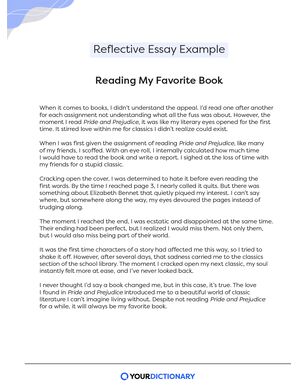
Reflective Essay Book
Creative communication.
This reflective essay example about the topic of creative writing is what you might expect to see at the college level.
I’ve always felt I excel in written communication. The skill of effectively communicating my thoughts and feelings through words and expressions seemed to come easily to me. However, I didn't realize how much my writing was lacking until my thoughts and feelings on writing were pushed nearly to their breaking point through my creative writing course. Learning the best way to manage time was a huge hurdle for me. I've always been a procrastinator. However, after the first day of class, I realized I would need to modify my thinking and approach to homework. I wasn't able to completely kill the procrastination habit I developed in high school, but I did learn some much-needed time management skills. I also learned how writing without the looming cloud of a deadline could open a creative door. A natural thinker and writer at heart, I thought I understood creative expression and wordplay... until my professor handed me my first grade. Upon looking at that striking "D" on the paper, I realized I would have to push myself harder and explore the depths my writing could reach. Not only did I learn to sharpen my technical writing chops, but I have found out how to dig into my creative soul to view my emotions and experiences in a whole new way. Going beyond the five-paragraph essay and fully exploring my feelings about a situation or action was challenging. This creative writing class pushed me to realize there isn't a limit on words when it comes to expressing something. I can convey a simple action a million different ways, and I mastered how to explore each one to find perfection in my written words. I also picked up new flexibility in my writing by opening my mind to different scopes of expression. Expressing all the changes that this class wrought in my writing is truly difficult. But, over the course of the eight weeks we spent together, I became a more competent writer. Not only do my words contain more depth and soul, but my writing itself has entered a whole new arena I didn't realize was possible. By studying new techniques and researching other approaches, I now have a sturdy foundation and a robust writing arsenal for future endeavors.
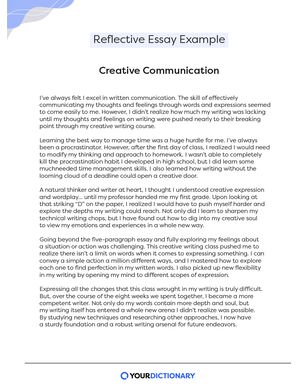
Reflective Essay Communication
Finding the perfect topic.
Half the battle in creating a great reflective paper is finding the perfect topic to write about. Your topic should be something that you experienced, learned, or grew from. It could also be a topic that requires you to think more deeply about a place or book.
Some fun, creative topics for self-reflection include:
- A fight with a family member - Why did it impact you? What did it change about you?
- The moment you feel in love - Explore the feelings and emotions that come with love and how it changes you.
- A sunset - What is it about the beauty of a sunset that impacts you?
- Your secret spot in your house - What about that spot is so important?
- Your first job - What was the experience like? Why was it meaningful?
- Your first date - Examine your emotions on the first date. Did it live up to the hype or fall short?
- Getting engaged - Discuss your feelings and the meaning of the experience.
- Experience in a college class - Class experiences are designed to change or mold you in some way. Discuss how you grew and fell short.
- Your first year in college - This is another larger-than-life event full of self-reflection.
- Is college important? - People feel strongly one way or another about college. What are your experiences?
- What college has taught you - How has attending college changed you and your thinking? Has it helped you grow as a person?
- A vacation you'll never forget - What about the vacation was so memorable?
- An incident you can't forget - Why can't you forget it? Explore your thoughts and emotions.
- Your most embarrassing moment - Everyone's most embarrassing moment is different, but there is always a lot of growth.
- Birth or death of a loved one - This can have a very profound effect on a person.
- Public speaking - People are either good or bad at public speaking. How did you feel?
- First fight with a friend - Were you able to get past the fight? How old were you? How did it change your relationship?
- Big win or loss of a sports team - This could be a sports team you were on or a sports team you love.
- Moving - This could be moving to college or moving away. Explore the way that the move affected you.
- Helping someone - Did you ever help a family or someone in need? What was the experience like? How did it make you feel as a person?
The Art of Self-Reflection
Reflecting on a personal experience might seem like an easy essay to write. However, to ace your reflection paper, dive deeply into your feelings and choose a topic that triggers a strong emotional response.
If a reflective essay doesn't fit you, try exploring more about argumentative essays , including tips for making a compelling argument.
How to Write a Reflective Essay: Your Guide to Self-Discovery

moment when you decide to put pen to paper, not just to tell a story, but to explore the layers of your own experiences. Think of it as an inward journey, where each word becomes a stepping stone, uncovering the unique narrative of your thoughts and feelings.
In this comprehensive guide, our online essay writing service experts will unravel the art of writing a reflective essay and explore valuable tips to make your narrative truly shine. From outlining the key elements to understanding the format, we'll equip you with the tools you need. And what better way to solidify your understanding than by delving into practical examples that showcase the beauty of this personal storytelling format? So, grab a cup of coffee, find a cozy corner, and let's embark on this exploration of introspection and storytelling together.

What Is Reflective Essay in Academic Writing
In the realm of academic writing, a definition of reflective essay encompasses a unique and personal piece that goes beyond the conventional boundaries of research papers and essays. It's not about presenting facts or arguing a thesis; instead, it's a canvas where you paint your experiences, thoughts, and emotions. Think of it as a thoughtful conversation with your readers, offering them a glimpse into your personal journey. Unlike traditional academic writing, reflective essay writing doesn't follow a rigid structure; it thrives on your voice, allowing you to share your insights and reflections on a particular topic or experience. Reflective essay meaning also involves storytelling that invites your audience to connect with your narrative on a more personal level, making it a powerful tool for self-expression within the academic landscape.
Reflection Essay Format
Writing a reflective essay involves a flexible format that can adapt to different purposes. Whether you're composing an academic piece or contributing to a magazine, the structure may vary. In academic contexts, the primary objective is consistent: instructors want students to engage in profound and critical thinking about specific learning experiences. Knowing how to write a good reflection essay may follow various formats, and here are a couple of examples from our college admission essay writing service :
- Exploring Personal Growth : This essay style serves as a tool for self-discovery. Imagine recounting a pivotal life moment, like overcoming a fear of public speaking. By analyzing this experience, you not only gain insights into your personal growth but also offer readers a glimpse into your journey of overcoming challenges.
- Literary Reflection : Here, you'll delve into the world of literature by reflecting on how a specific character or storyline impacted you personally. Consider writing about a character's resilience in the face of adversity and draw connections to your own life experiences. This reflective essay format allows for a creative blend of personal narrative and literary analysis.
Remember, when you write a reflective essay, the beauty lies in its adaptability. Unlike more rigid academic styles, you have the freedom to let your personal voice shine through, creating a narrative that resonates with your unique experiences.
- You should use Times New Roman, 12 font, and double-spaced.
- 1" margins.
- All of your titles must be centered.
- The top right of every page includes your last name and the page number.
- The header on your paper should have your name, the professor's name, the course number, and the date.
- The last page must include a Works Cited.
- Have a header on top of every page.
- Make sure every page is numbered in the top right corner.
- Your essay must be divided into four parts: title page, Abstract, Main Body, and References.
Reflective Essay Outline
Alright, imagine crafting an essay is like going on a road trip. Now, think of the essay outline as your trusty map. It's not about restricting your storytelling—it's more like having a game plan before you hit the road. This outline is your backbone, making sure your essay has a solid structure and flows smoothly. It's there to guide you, not fence you in, as you share your personal journey and reflections.
So, what are the parts of a typical reflective essay?
- The introduction for reflection paper is where you set the stage for your reflection. Introduce the topic or experience you'll be reflecting upon. Consider a hook in your intro for reflective essay to grab your reader's attention and end with a clear thesis statement that outlines the main points of your reflection.
- Each paragraph in the body is dedicated to a specific aspect of your reflection. These paragraphs delve into the details of your experiences, thoughts, and feelings. They can follow a chronological order or be organized thematically, depending on your preference and the nature of your reflection.
- Personal insights are all about digging deep into your thoughts and drawing out meaningful insights. Here, you explore the significance of your experiences and how they've contributed to your personal growth or understanding.
- The conclusion is for wrapping things up by summarizing the key points of your reflection. Reinforce the significance of your experiences and perhaps suggest how they might influence your future actions or perspectives. It's a moment to leave a lasting impression on your reader.
Remember, the outline is flexible, and these parts are more like guideposts than strict rules. They're there to help you organize your thoughts and present them in a coherent and engaging way.
Introduction
The reflective essay introduction is like the opening act of a gripping story, designed to captivate your reader's emotions. It's your opportunity to set the stage and provide a glimpse into the core theme of your reflection. Consider an experience that left a profound impact on you, perhaps overcoming a fear or embracing a new perspective. Craft your introduction with vivid details, painting a mental picture for your reader.
For instance, describe the nervous energy before a significant event, the racing heartbeat, or the tension in the air. A powerful introduction should beckon the reader into the heart of your narrative, making them eager to embark on this introspective journey with you.
Body Paragraphs
The body paragraphs are the narrative chapters, each dedicated to a distinct aspect of your experience. These paragraphs should seamlessly guide your reader through the chronological or thematic evolution of your reflections. Dive deep into sensory details, emotions, and the intricacies of the journey you're recounting.
Consider breaking down your narrative into key moments or revelations, allowing each paragraph to unfold like a scene in a movie. This is where you lay bare the highs, lows, and transformative moments, fostering a connection between your reader and the essence of your reflection.
Lastly, let's touch on how to conclude a reflective essay. It is the resolution of your writing, akin to the closing scene of a movie. It's your chance to leave a lasting impression, wrapping up the narrative with a sense of reflection and insight. Revisit the central theme of your essay, reinforcing its significance in your personal growth or understanding. You might also hint at how this experience will influence your future actions or perspectives. A compelling conclusion should linger in the reader's mind, inviting them to carry the essence of your reflection beyond the final words.
5 Essential Reflective Essay Writing Tips
Now, let our experts, who professionally handle your ' write my essay online ' requests, share 5 essential tips to guide you on this writing journey:
Connect Emotionally: When unsure how to write a good reflective essay, don't shy away from emotions. Readers connect deeply with personal stories infused with genuine feelings. Share your joys, struggles, and moments of realization in a way that makes your readers feel the heartbeat of your experiences.
Be Authentic: Your reflective essays are your personal narratives, so embrace authenticity. Don't try to fit into a mold or adhere to expectations. Speak from the heart, use your voice, and let your unique perspective shine through. Authenticity adds a powerful layer to your storytelling.
Show, Don't Just Tell: Instead of merely stating facts, show the reader your experiences through vivid descriptions. Engage the senses and paint a picture with your words. Take your readers on a sensory journey, allowing them to visualize and immerse themselves in your reflections.
Reflect, Don't Recap: A reflective writing essay isn't just a summary of events; it's an exploration of their impact on you. Instead of merely recounting what happened, delve into why it mattered. Reflect on how these experiences shaped your thoughts, beliefs, or actions, offering deeper insights to your readers.
Organize Your Thoughts: Structure is key when it comes to knowing how to make a reflective essay successfully. Outline your ideas before you start writing, creating a roadmap for your essay. Consider the chronological order of events or organize them thematically. A well-organized essay helps your readers follow the flow of your reflections seamlessly.
.png)
Reflective Essay Examples
Understanding the intricacies of the writing process is challenging without practical examples, regardless of theoretical knowledge. With our existing outline in place, let's delve into the creation of an engaging example of a reflective essay.
Final Thoughts
As you start your reflective essay writing, think of it as a conversation with a friend. Be genuine, share the highs and lows, and don't worry about sounding perfect. The beauty lies in your authenticity. Much like when learning how to write a personal essay , reflect on your experiences with an open heart and let your words flow naturally. This isn't just about writing; it's about discovering more about yourself and inviting others into your world. So, enjoy the ride, be true to yourself, and let the storytelling unfold.

What Should Be Avoided When Writing a Reflective Essay?
What is the meaning of reflective essay, what is a good reflective essay example.

- Plagiarism Report
- Unlimited Revisions
- 24/7 Support
- Directories
Reflective essays
Reflective essays are academic essays; what makes an essay "good" will work for a reflective essay. What is different about a reflective essay is that the essay is about you and your thinking. However, you will need evidence from your course to back up your reflections.
You should structure a reflective essay as an essay, that is write to persuade your reader of your key reflections (or argument). The diagram above, details how to stucture your reflections through the essay. To find out more see the section on essay writing .
Business example
The following example comes from business. Thanks to Dr Colleen Hayes for the three samples.
Students were asked to write a reflective essay on their learning in the course by responding to the following question:
What key thing have you learned about corporate social responsibility in the course?
Example 1: Retelling
This writing is (1) descriptive/listing of content, not reflective and (2) not properly referenced (the definition of stakeholders is directly copied from Freeman in the lecture slides.
Example 2: Relating
This writing involves relating to personal experience and has some integration of course concepts (stakeholders).
Example 3: Reflecting
More reflective (forward-looking), better citation and integration of multiple course concepts, and reflection that links with personal experience.
An anthropology marking rubric
For this assessment, students were required to write a 1500-1800 word essay building on the themes of the course to address the question "We are all pirates". Attached under reference documents is the rubric used to mark the essay (thanks to Dr Caroline Schuster). Notice that it requires both the reflection (reflect, relate and retell) as well as the poor traditional requirements of an essay (Writing and organisation, Supporting claims with scholarly sources).
Reflective writing
Learning journals
Reference Documents
- Sample rubric from Anthropology (PDF, 243.24 KB)
Use contact details to request an alternative file format.
- ANU Library Academic Skills
- +61 2 6125 2972
Guide on How to Write a Reflection Paper with Free Tips and Example

A reflection paper is a very common type of paper among college students. Almost any subject you enroll in requires you to express your opinion on certain matters. In this article, we will explain how to write a reflection paper and provide examples and useful tips to make the essay writing process easier.
Reflection papers should have an academic tone yet be personal and subjective. In this paper, you should analyze and reflect upon how an experience, academic task, article, or lecture shaped your perception and thoughts on a subject.
Here is what you need to know about writing an effective critical reflection paper. Stick around until the end of our guide to get some useful writing tips from the writing team at EssayPro — a research paper writing service
What Is a Reflection Paper
A reflection paper is a type of paper that requires you to write your opinion on a topic, supporting it with your observations and personal experiences. As opposed to presenting your reader with the views of other academics and writers, in this essay, you get an opportunity to write your point of view—and the best part is that there is no wrong answer. It is YOUR opinion, and it is your job to express your thoughts in a manner that will be understandable and clear for all readers that will read your paper. The topic range is endless. Here are some examples: whether or not you think aliens exist, your favorite TV show, or your opinion on the outcome of WWII. You can write about pretty much anything.
There are three types of reflection paper; depending on which one you end up with, the tone you write with can be slightly different. The first type is the educational reflective paper. Here your job is to write feedback about a book, movie, or seminar you attended—in a manner that teaches the reader about it. The second is the professional paper. Usually, it is written by people who study or work in education or psychology. For example, it can be a reflection of someone’s behavior. And the last is the personal type, which explores your thoughts and feelings about an individual subject.
However, reflection paper writing will stop eventually with one very important final paper to write - your resume. This is where you will need to reflect on your entire life leading up to that moment. To learn how to list education on resume perfectly, follow the link on our dissertation writing services .
Unlock the potential of your thoughts with EssayPro . Order a reflection paper and explore a range of other academic services tailored to your needs. Dive deep into your experiences, analyze them with expert guidance, and turn your insights into an impactful reflection paper.

Free Reflection Paper Example
Now that we went over all of the essentials about a reflection paper and how to approach it, we would like to show you some examples that will definitely help you with getting started on your paper.
Reflection Paper Format
Reflection papers typically do not follow any specific format. Since it is your opinion, professors usually let you handle them in any comfortable way. It is best to write your thoughts freely, without guideline constraints. If a personal reflection paper was assigned to you, the format of your paper might depend on the criteria set by your professor. College reflection papers (also known as reflection essays) can typically range from about 400-800 words in length.
Here’s how we can suggest you format your reflection paper:

How to Start a Reflection Paper
The first thing to do when beginning to work on a reflection essay is to read your article thoroughly while taking notes. Whether you are reflecting on, for example, an activity, book/newspaper, or academic essay, you want to highlight key ideas and concepts.
You can start writing your reflection paper by summarizing the main concept of your notes to see if your essay includes all the information needed for your readers. It is helpful to add charts, diagrams, and lists to deliver your ideas to the audience in a better fashion.
After you have finished reading your article, it’s time to brainstorm. We’ve got a simple brainstorming technique for writing reflection papers. Just answer some of the basic questions below:
- How did the article affect you?
- How does this article catch the reader’s attention (or does it all)?
- Has the article changed your mind about something? If so, explain how.
- Has the article left you with any questions?
- Were there any unaddressed critical issues that didn’t appear in the article?
- Does the article relate to anything from your past reading experiences?
- Does the article agree with any of your past reading experiences?
Here are some reflection paper topic examples for you to keep in mind before preparing to write your own:
- How my views on rap music have changed over time
- My reflection and interpretation of Moby Dick by Herman Melville
- Why my theory about the size of the universe has changed over time
- How my observations for clinical psychological studies have developed in the last year
The result of your brainstorming should be a written outline of the contents of your future paper. Do not skip this step, as it will ensure that your essay will have a proper flow and appropriate organization.
Another good way to organize your ideas is to write them down in a 3-column chart or table.

Do you want your task look awesome?
If you would like your reflection paper to look professional, feel free to check out one of our articles on how to format MLA, APA or Chicago style
Writing a Reflection Paper Outline
Reflection paper should contain few key elements:
Introduction
Your introduction should specify what you’re reflecting upon. Make sure that your thesis informs your reader about your general position, or opinion, toward your subject.
- State what you are analyzing: a passage, a lecture, an academic article, an experience, etc...)
- Briefly summarize the work.
- Write a thesis statement stating how your subject has affected you.
One way you can start your thesis is to write:
Example: “After reading/experiencing (your chosen topic), I gained the knowledge of…”
Body Paragraphs
The body paragraphs should examine your ideas and experiences in context to your topic. Make sure each new body paragraph starts with a topic sentence.
Your reflection may include quotes and passages if you are writing about a book or an academic paper. They give your reader a point of reference to fully understand your feedback. Feel free to describe what you saw, what you heard, and how you felt.
Example: “I saw many people participating in our weight experiment. The atmosphere felt nervous yet inspiring. I was amazed by the excitement of the event.”
As with any conclusion, you should summarize what you’ve learned from the experience. Next, tell the reader how your newfound knowledge has affected your understanding of the subject in general. Finally, describe the feeling and overall lesson you had from the reading or experience.
There are a few good ways to conclude a reflection paper:
- Tie all the ideas from your body paragraphs together, and generalize the major insights you’ve experienced.
- Restate your thesis and summarize the content of your paper.
We have a separate blog post dedicated to writing a great conclusion. Be sure to check it out for an in-depth look at how to make a good final impression on your reader.
Need a hand? Get help from our writers. Edit, proofread or buy essay .
How to Write a Reflection Paper: Step-by-Step Guide
Step 1: create a main theme.
After you choose your topic, write a short summary about what you have learned about your experience with that topic. Then, let readers know how you feel about your case — and be honest. Chances are that your readers will likely be able to relate to your opinion or at least the way you form your perspective, which will help them better understand your reflection.
For example: After watching a TEDx episode on Wim Hof, I was able to reevaluate my preconceived notions about the negative effects of cold exposure.
Step 2: Brainstorm Ideas and Experiences You’ve Had Related to Your Topic
You can write down specific quotes, predispositions you have, things that influenced you, or anything memorable. Be personal and explain, in simple words, how you felt.
For example: • A lot of people think that even a small amount of carbohydrates will make people gain weight • A specific moment when I struggled with an excess weight where I avoided carbohydrates entirely • The consequences of my actions that gave rise to my research • The evidence and studies of nutritional science that claim carbohydrates alone are to blame for making people obese • My new experience with having a healthy diet with a well-balanced intake of nutrients • The influence of other people’s perceptions on the harm of carbohydrates, and the role their influence has had on me • New ideas I’ve created as a result of my shift in perspective
Step 3: Analyze How and Why These Ideas and Experiences Have Affected Your Interpretation of Your Theme
Pick an idea or experience you had from the last step, and analyze it further. Then, write your reasoning for agreeing or disagreeing with it.
For example, Idea: I was raised to think that carbohydrates make people gain weight.
Analysis: Most people think that if they eat any carbohydrates, such as bread, cereal, and sugar, they will gain weight. I believe in this misconception to such a great extent that I avoided carbohydrates entirely. As a result, my blood glucose levels were very low. I needed to do a lot of research to overcome my beliefs finally. Afterward, I adopted the philosophy of “everything in moderation” as a key to a healthy lifestyle.
For example: Idea: I was brought up to think that carbohydrates make people gain weight. Analysis: Most people think that if they eat any carbohydrates, such as bread, cereal, and sugar, they will gain weight. I believe in this misconception to such a great extent that I avoided carbohydrates entirely. As a result, my blood glucose levels were very low. I needed to do a lot of my own research to finally overcome my beliefs. After, I adopted the philosophy of “everything in moderation” as a key for having a healthy lifestyle.
Step 4: Make Connections Between Your Observations, Experiences, and Opinions
Try to connect your ideas and insights to form a cohesive picture for your theme. You can also try to recognize and break down your assumptions, which you may challenge in the future.
There are some subjects for reflection papers that are most commonly written about. They include:
- Book – Start by writing some information about the author’s biography and summarize the plot—without revealing the ending to keep your readers interested. Make sure to include the names of the characters, the main themes, and any issues mentioned in the book. Finally, express your thoughts and reflect on the book itself.
- Course – Including the course name and description is a good place to start. Then, you can write about the course flow, explain why you took this course, and tell readers what you learned from it. Since it is a reflection paper, express your opinion, supporting it with examples from the course.
- Project – The structure for a reflection paper about a project has identical guidelines to that of a course. One of the things you might want to add would be the pros and cons of the course. Also, mention some changes you might want to see, and evaluate how relevant the skills you acquired are to real life.
- Interview – First, introduce the person and briefly mention the discussion. Touch on the main points, controversies, and your opinion of that person.
Writing Tips
Everyone has their style of writing a reflective essay – and that's the beauty of it; you have plenty of leeway with this type of paper – but there are still a few tips everyone should incorporate.
Before you start your piece, read some examples of other papers; they will likely help you better understand what they are and how to approach yours. When picking your subject, try to write about something unusual and memorable — it is more likely to capture your readers' attention. Never write the whole essay at once. Space out the time slots when you work on your reflection paper to at least a day apart. This will allow your brain to generate new thoughts and reflections.
- Short and Sweet – Most reflection papers are between 250 and 750 words. Don't go off on tangents. Only include relevant information.
- Clear and Concise – Make your paper as clear and concise as possible. Use a strong thesis statement so your essay can follow it with the same strength.
- Maintain the Right Tone – Use a professional and academic tone—even though the writing is personal.
- Cite Your Sources – Try to cite authoritative sources and experts to back up your personal opinions.
- Proofreading – Not only should you proofread for spelling and grammatical errors, but you should proofread to focus on your organization as well. Answer the question presented in the introduction.
'If only someone could write my essay !' you may think. Ask for help our professional writers in case you need it.
Do You Need a Well-Written Reflection Paper?
Then send us your assignment requirements and we'll get it done in no time.
Related Articles
.webp)


How to Write a Reflective Essay
To write a reflective essay, choose a personal experience and reflect on its impact. Outline your thoughts, starting with an introduction. In the body, describe the experience and your reflections. Conclude by summarizing your insights. Revise for clarity and coherence.
Reflective essay definition: "Reflective writing is a practice of analyzing a situation from a perspective that may differ from the viewpoint of the audience. Reflective writing entails the process of collecting data, organizing and synthesizing the gathered data, and expressing a personal opinion about the collected data and opinion." Reflection on one's experiences is reflected in one's writing.
This type of writing challenges your ability to look back onto one's own experiences and put it on paper in a well-structured and sort of a narrative way. The aim is to describe your feelings, a certain perspective on the event. Later on, you will need to make a conclusion on what impact something particular has had on you. There will be a need to describe what you have learned from that and how this new knowledge may have changed your perception.
Let's dive in!
What Is a Reflective Essay?
"Good writing is supposed to evoke sensation in the reader – not the fact that it is raining, but the feeling of being rained upon." - E.L. Doctorow.
A reflective essay is a type of writing where the author explores and analyzes their life experiences. Through this exploration, the writer reflects on how these experiences have contributed to their personal evolution, growth, or development.
Knowing how to write a reflection essay involves more than a predetermined format but is an art of creative expression. As an aspiring writer, you must delve into personal experiences. From topics like your first day in college to pivotal global events, you must infuse unique perspectives into your narrative. *Choosing the Right Theme
Whether given a prompt by a teacher or the autonomy to choose, theme selection is pivotal. Your topics may range widely, but remember to engage your emotions to breathe life into the words. If you’re unsure what to do, you can buy essays online to be your guide.
*Weaving a Compelling Narrative
Create a story that envelops the reader by ensuring meticulous attention to adjectives and details. A reflective essay transcends mere recounting and immerses readers in a world where emotions and experiences unfold naturally.
*The Power of Honest Reflection
Consistency and relevance are the bedrock of compelling reflective essays. Be clear and coherent so your readers can seamlessly follow your train of thought. Embrace your emotions for authenticity in expression.To craft an excellent reflection essay, blend creativity with honesty. Let emotions flow naturally, and carefully choose vocabulary that aligns with your chosen format.
Struggling with your Reflective Essay Homework?
Get your assignments done by real pros. Save your precious time and boost your marks with ease.
How to Start Writing a Reflection Essay
Follow these steps to get started:
- Comprehend and condense the content.
- Examine the material thoroughly.
- Choose a central theme.
- Draw connections among your viewpoints.
- Start with an introductory segment.
- Craft the main body of the essay.
- Conclude effectively.
- Review and refine your writing.
Now you might already have an idea of what the reflection writing is. Yet, before you get to the actual writing process, let's take a look at some steps that a student should take. Their overview is highly likely to help you define your course of action.
First, think of events, places, people, books, and whatnot. Pick a certain object or an event that has had an impact on you, notwithstanding whether it was negative or positive.
Choose a certain thing that you really feel like talking about at this particular moment in time. Think of the effects it had on you; be ready to describe this experience in detail.
A reflection essay requires having your thoughts and views on particular subjects on paper. Some students choose to abstain from storytelling here. Still, never forget to add your personality in writing, make your own voice heard.
- Choose the topic
- Reflect on it
- Make an outline
- Write a draft
- Compose specific body parts
- Make a conclusion
So, let's proceed with answering the key question - how to write a reflective essay? What to start with? What is the structure?
Although reflective writing has a similar format with any other essay, it has some special features that each writer working on such a piece should bear in mind. In the sections below, you will find answers to all these questions.
We will reveal the crucial components of A-grade worth writing for you.
Reflective Essay Outline&Structure
As all the types of academic writing, a reflection essay requires a proper outline with all the crucial elements indicated. It will lead a writer throughout the whole piece as well as you as an author through each step of creating the material.
In this case, it is even more essential, as while writing and reflecting on your own experience, it's risky to lose the train of thoughts and go the wrong direction.
That is why you must have a clear structure at hand. Following it closely would guarantee a coherent writing piece as a result.
Let's take a look at the basic parts that you may stick to while working on your reflective essay paragraphs.
This is a pretty common reflective essay scheme. Yet, it is still able to help you follow the topic without any risk of going too far or in a completely wrong direction with this text.
A reflection essay outline always consists of good old traditional parts, which are as follows:
- Introduction;
- Conclusion.
An Introduction is a part where the main reflective essay thesis must be coherently outlined and presented. Readers should get to know at this point what the whole paper is going to be about.
In this section, you are also free to convey to the audience a particular impression you might have had on the subject matter. It of crucial importance to be consistent here in this part. Don't forget to mention all the main points in the right order with appropriate linking.
Example of the thesis: "The moment I'd read "Pride and Prejudice" when I was eleven, it was like my eyes opened for the first time. This masterpiece stirred unconditional love for classics within me that I didn't realize could exist."
The Body part is usually the core of the work, and it must include all the main ideas. Each sentence must be well presented and clearly structured.
In this part, a writer is answering the following question. How the event or a situation has changed him, and in what way? It is important to indicate several main effects and describe each one in a separate paragraph. A short summary must be provided by examples as supporting details.
For example, if you write that something has made you more motivated, give a particular example from life. Note down when you felt motivated and how a certain situation has helped you succeed.
In the Conclusion section the main points from the body of the text need to be re-translated. Recap the ideas you've already provided, offer some final thoughts. You may finish the paper with a rhetorical question aimed at the audience. You may also contemplate possible future events in your life that might result from the experience you've already covered.
Having the main aspects covered, let's talk about the actual business now.
Did you like our inspiring Reflective Essay Guide?
For more help, tap into our pool of professional writers and get expert essay editing services!
How to Start a Reflective Essay : Introduction
In the introductory part of your reflective essay, you'll articulate the essay's objective and theme. It's here where you'll present the thesis of your paper and provide the reader with an understanding of the motivations behind your choice of subject.
If you’re stuck wondering “how do I write my essay ”, you are not alone. Completing this assignment is challenging for many students. The pivotal first sentence of the essay is often a stumbling block.
Pondering, how do you write a reflective essay? Remember that the introduction holds the power to captivate or lose your reader. You must enthrall your audience by weaving in a compelling hook like:
*Inspiring quote*Rhetorical question
*Interesting anecdote
*Intriguing fact
Capture attention by highlighting your narrative’s most intriguing facets. Unveil a potent thesis statement, making it succinct yet impactful.
Avoid delving into excessive details. Instead, kindle curiosity, inviting readers to journey through every line. Another approach is offering a glimpse of forthcoming conclusions, creating anticipation.
Check this example, "A childhood incident forced me into premature adulthood." Mastering this art ensures your introduction resonates, leaving readers eager for the rest of your narrative.
How to Write a Body Section
Ideally, the main part should be divided into three paragraphs. Each one should include a separate idea or reflect a particular thought on the matter. Here's how you can do it:
1. In the first paragraph, mention one reason the subject impressed you and why. Give more details and describe your emotions. This piece is all about reflective writing, so there are no right answers. The core is to offer your original perspective. Speculate, be open, but don't forget about the "conclusion – reason – example" format that is key here.
2. In the second part you should present the reasoning for choosing to write on a specific subject. Mention what impact it has had on you. Stick to the formula outline in the aforementioned paragraph.
3. In the third part, mention yet another point that you might have on your mind. You should write about how the person, event, book, news, etc. have influenced you and why.
When reflecting on the subject, remember to ask yourself the following questions. They will give you more food for thought and will help in keeping you in the right direction:
- What have you found out about your personality after this experience?
- Was it a good or bad experience?
- What are the lessons you've learned from it?
- Why do you think this specific event has happened? Did you make the right decision at a time?
- If you had a chance to change something, what exactly would it be?
- What are your general thoughts on a matter? Was it useful (rewarding?) experience or not? Why?
Bear these reflection examples in mind when you write each body part paragraph. Reflect on every chosen aspect in a separate paragraph.
The Conclusion of a Reflection Essay
There are several ways to finish writing a reflective essay. Let's take a look at some of them:
- Summarize all the points;
- Reflect on the "What if" situation. How would you act with your current experience and the views you have now? Would your actions remain the same, or would you change anything?
- You can also approach this point in another way. Try to answer the following question in your text - how will you act in the future, if this event repeats? Will you do anything differently? Why?
- Formulate a rhetorical question aimed at your readers.
- Outline what exactly you've learned from the situation in question.
Your conclusion should be brief and comprehensive. Every reader should experience the feeling of a story that has been told with all the t's crossed.
Tips for Writing a Good Reflective Essay
- Even though you are working on a personal story, it is still academic writing, which requires appropriate language and sources. So, do your research, study the subject from as many viewpoints as possible. Reference relevant sources. This will show your awareness of the topic and the ability to analyze the subject from different angles.
- Don't mention not credible resources like: "a friend of mine thinks," "my mom says," etc.
- To get a deeper understanding of what reflective writing looks like, read some samples, and get used to the format.
- Use the first-person narrative like "I" or "Me," but don't overwork it. There is no need to get too personal.
- To make your story more captivating and logical, don't forget to mention a turning point that has influenced you.
Reflective Essay Examples
To make you have a more vivid picture of a reflection essay, we've prepared a sample, with a detailed description of its structure.

The example above demonstrates a coherent story that covers the writer's feelings, one's standpoint, thought on the experience, and life-changing conclusions reached afterward.
It is spiced with a nice choice of adjectives, so readers may vividly imagine the story and stay focused on it. Pay attention, that there is no extra information given, besides the actual subject and its impact.
Reflective Essay Topics
A reflective essay topic may be assigned by a teacher or chosen by a student. Since the task is all contemplating personal experience, you may treat such a piece as an excerpt from a diary that you are ready to share with others.
Choose something that does matter in your book. If you're a bit lost and don't have a clue about the right theme, here're some guiding examples.
Important people:
- Someone, you've enjoyed learning from (nor necessarily a teacher.) It may be your best friend, somebody from your family, etc.
- A house from your childhood;
- A city or a country you've been to;
- An important place that has inspired you.
Life-changing events:
- A time of your biggest achievement\failure;
- An overwhelming experience;
- A concert, a match or a performance that you've visited;
- A significant memory from your childhood;
- An important dialog.
- A movie that has impressed you;
- A book that happened to change your perception;
- A magazine that you used to read a lot;
- Social media platform that has changed your life.
These are some reflective essay ideas, which you may consider covering in your writing.
Whether you're good at reflecting on your life or not, mastering the skill of self-awareness is crucial. We all experience ups and downs, and it's important to learn from our mistakes and make conscious decisions in our lives.
To become self-aware, be willing to admit failure, accept critical feedback, consider different perspectives, and be open to changing your views. Reflective writing is not just about creating, but also about critical thinking. Be prepared to assess and evaluate your own choices and decisions.
Frequently asked questions
How to write a good reflective essay check out these helpful hacks .
Need to understand how to create a reflective essay? Worry not! Crafting a standout reflective essay is a breeze with these essential tips. Start by capturing attention with a compelling hook. Unveil intriguing aspects of your story, and wrap it up with a potent thesis statement. Keep it concise captivating, and let your personal journey shine through until the end.
How to End a Reflective Essay? Here’s How to Conclude with Impact
A professional custom essay writing service recommends ending your reflective essay with a bang! Wrap up your reflection writing with a strong conclusion. Make it impactful and memorable by summarizing key points, offering final thoughts, providing lessons, and perhaps posing a rhetorical question for more reflection. Keep things concise to ensure your ending leaves a lasting impression on your readers.
Writing a Reflective Essay? Do It Without Losing Your Focus
Discover how to do a reflective essay without losing focus by skillfully crafting a clear introduction that hooks your reader. Ensure a seamless flow by presenting the main ideas coherently in the body of your essay. Conclude with impact, leaving a lasting impression with a strong summary.
Engage your reader throughout, guaranteeing captivation from your opening lines to the concluding salvo. Let your body paragraphs tell an intimate story while your introduction captures the reader's attention.
Featured Posts
How to write a scholarship essay.

How to Write a Movie Review

How to Write an Argumentative Essay

How to Write a Cause and Effect Essay
.jpg)
How to Write an Expository Essay

How to Write an Analytical Essay

Reflective Essay

Reflective Essay - Writing Steps with Examples, Tips, and Topics
Published on: Sep 21, 2020
Last updated on: Jan 29, 2024

People also read
Best Reflective Essay Topics & Ideas for Students
Reflective Essay Outline - Samples & Template
Share this article
A reflective essay is a form of writing where the writer reflects on a personal experience. Have you been assigned one but don’t know how to write?
Don’t fret!
Read on to learn in simple steps and follow the useful tips and examples given below. By the end of the blog, you will know everything you need to write an excellent reflective essay.
So let’s dive in!
On This Page On This Page -->
What is a Reflective Essay?
A reflective essay is a type of essay where the writer describes a personal experience or event that they observed or examined. Reflective writing involves thinking or pondering about a specific topic and writing your thoughts.
The content of a reflective essay is subjective. This means, the writer discusses the topic from their own personal point of view.
The writer presents their thoughts and reflections in a structured and coherent manner. It combines elements of storytelling, analysis, and introspection to create a narrative that engages the reader and offers valuable insights.
What is the Purpose of Reflective Writing?
Self-reflective essays are often used as an opportunity to explore your thoughts and feelings more deeply. The main goals of reflective writing are to;
- Make a connection between yourself and the text
- Analyze what you have heard, read, or seen
- Write subjectively and help identify your interests
- Think about what you have learned.
- Develop your critical and narrative skills
Here is a video that reflective writing in simple terms:
How to Write a Reflective Essay?
Reflective essays can be very difficult to write. However, following the steps below can make your writing process easier and more effective.
- Select a Meaningful Topic
The first step in writing a great reflective essay is to choose a good topic. You need to do a lot of brainstorming, mind mapping , and a bit of research to come up with a good topic.
Choose a topic that holds personal significance for you. It could be a specific event, a challenging situation, a memorable encounter, or a period of personal growth. Select a topic that allows for deep introspection and provides ample material for reflection.
- Reflect and Introspect
Ponder on your chosen topic and explore your thoughts, feelings, and reactions associated with it.
Ask yourself probing questions, such as " How did this experience impact me? " or " What did I learn from this situation? " This introspective phase forms the foundation of your essay, allowing you to dig deep and extract valuable insights.
- Develop a Clear Thesis Statement
Craft a concise and focused thesis statement that encapsulates the main point or lesson learned from your reflection.
This statement will serve as a guiding principle for your essay, ensuring that your writing remains coherent and purposeful.
- Chart an Outline
Create an outline that organizes your thoughts and provides a logical structure for your essay.
Divide your essay into sections including the introduction, body paragraphs, and conclusion. Outline the main ideas, experiences, and reflections you plan to include in each section.
Want to learn more about how to create an outline? Here is our comprehensive reflective essay outline guide for you.
- Write a Catchy Introduction
Start your essay with an attention-grabbing opening that sets the tone and introduces the topic to the reader.
Engage your audience by sharing a captivating anecdote, posing a thought-provoking question, or presenting a compelling quote. Clearly state your thesis to provide a roadmap for your reflective journey.
- Write Main Body Paragraphs
In the body paragraphs, vividly describe the experiences or events that shaped your reflection. Use sensory details and specific examples to paint a clear picture for your readers.
After describing the experience, delve into the reflection and analysis phase. Explore the significance of the experience and its impact on your personal growth, beliefs, or worldview.
Analyze the reasons behind your thoughts, emotions, and reactions.
- Provide a Thoughtful Conclusion
Wrap up your essay by summarizing your main points and reinforcing the significance of your reflection. Share the insights and lessons you gained from the reflection process.
For instance, what did you learn about yourself? How did this experience contribute to your personal development?
Be honest and authentic in your reflections, demonstrating vulnerability and self-awareness. Don't present new information here, but summarize everything that happened in the essay.
- Revise and Edit
Once you have completed your first draft, revise and edit your essay for clarity, coherence, and grammar. Pay attention to the flow of your ideas, sentence structure, and word choice.
Seek feedback from peers or mentors to gain different perspectives and refine your essay further. This way, your final draft will turn out to be an interesting and valuable piece of work.

Paper due? Why Suffer? That's our job.
Reflective Essay Structure
The structure of the reflective essay is the same as other types of essays. It contains an introduction, several body paragraphs, and a conclusion.
Here is the basic reflective essay format that you can use:
Letâs learn about the components of a reflective essay in depth:
Reflective Essay Introduction
A reflective essay also starts with an introduction, like all other essays. An essay introduction should be brief but relevant to the topic. In this part, you can give a general overview of the topic to the reader.
Start your essay with a strong hook statement . The hook statement is the first thing that the reader reads in the introduction part.
In the introduction part, state the thesis statement but donât give too much information in this statement.
Remember that in this part, only give a brief overview and donât write in-depth information.
Reflective Essay Body Paragraphs
Writing the body paragraphs is the hardest part of the reflective essay. Some writers spend a lot of time writing body paragraphs. If the outline is not created well, then writing the body paragraphs is a time-consuming process.
It is the most important part of the essay and follows the proper chronological order. Describe the main issues in order related to the described event.
The body paragraphs are well-focused, and it is not a summary of your experience. Each body paragraph end with a concluding sentence.
Reflective Essay Conclusion
The conclusion is the last part of the essay. In this part, you should provide a summary of the entire essay. Moreover, do not repeat the same point again and again.
Make sure the conclusion of the essay is powerful and encourages the readers to do further research. In this concluding part, restate the thesis statement, and no need to add new ideas.
Tips for Writing a Reflective Essay
Here are some writing tips that can make your reflective essay even better, so try following these in your essay:
- Choose the right topic for the essay, make sure that you have enough information
- Use an engaging and narrative tone throughout the essay with an overall emotion or theme in mind.
- Try to make the essay credible and informative
- Reflect critically on the significance of the experiences and analyze the reasons behind your thoughts, emotions, and reactions.
- Incorporate relevant theories, concepts, or academic frameworks to deepen your analysis.
- Be authentic and honest in sharing your insights and lessons learned from the reflection process.
- Connect your personal experiences to broader contexts or universal themes to create a relatable and impactful essay.
- Support your thesis statement with strong examples and arguments.
Ref lective Essay For mat
Two commonly used formatting styles for academic writing are the APA and the MLA styles. Each style has its unique guidelines for formatting, including structure, citations, and references.
APA Style Reflective Essay Format
Formatting your essay in APA requires the following:
- Times New Roman
- Double line-spacing
- 1" margins
- Page number on the top-right
- Include the Title Page, Main Body, and References.
MLA Style Reflective Essay Format
The MLA style recommends the following formatting guidelines:
- 1â margins
- Last name and page number in the top-right
- âWorks Citedâ section on the last page
Reflective Essay Examples
Check out some reflective essay samples that can give you a better understanding of the reflective essay.
Reflective Essay Example for High School
Personal Reflective Essay Example
Reflective Essay Outline
Example of Reflective Essay on Learning Experience
Reflective Essay Example About Life Experience
Reflective Essay Topics - H2
In a reflective essay, you write about your personal experience, thoughts, and significant moments of your life. Choosing the right topic for the essay sometimes becomes a challenging task, but here are some ideas that can help you out.
- A surprise that you prepared for someone
- The first thing you think of in the morning
- When someoneâs words made you cry
- When you laughed uncontrollably with someone
- Swimming in a mountain lake
- The experience of an earthquake or natural disasters
- A vacation place that you liked in particular
- Crossing a bridge and looking out over the water.
- Your favorite persuasive essay topic
- Place where you feel safe
Need more topics to get your thoughts running? Here are more reflective essay topics to help you out!
Writing a reflective essay can be a transformative experience as you discover your own thoughts and feelings along the way. By following the writing steps and tips, you can enhance this experience by writing an essay that is interesting, informative, and engaging.
So donât hesitate to start writing a reflective paper today! Youâve got everything you need.
Still, if you are in a race against time or canât write your essay for other reasons, donât despair. The auto essay writer at CollegeEssay.org is here to help you out!
We also have a team of expert writers ready to assist you 24/7. Whether you need help with refining your ideas, structuring your essay, or polishing the final draft, we can lend our expertise.
So hire our custom writing service to receive customized and professional reflective essays within the deadline!
Frequently Asked Questions
How many paragraphs are in a reflective essay.
In a reflective essay, you should follow a 5-paragraph format. However, you can add more paragraphs, and it depends on your chosen topic.
What is the goal of a reflective essay?
Writing a reflective essay aims to explore how they have changed and learned from their experiences.
Barbara P (Literature, Marketing)
Barbara is a highly educated and qualified author with a Ph.D. in public health from an Ivy League university. She has spent a significant amount of time working in the medical field, conducting a thorough study on a variety of health issues. Her work has been published in several major publications.
Paper Due? Why Suffer? That’s our Job!

Keep reading

- Privacy Policy
- Cookies Policy
- Terms of Use
- Refunds & Cancellations
- Our Writers
- Success Stories
- Our Guarantees
- Affiliate Program
- Referral Program
- AI Essay Writer
Disclaimer: All client orders are completed by our team of highly qualified human writers. The essays and papers provided by us are not to be used for submission but rather as learning models only.

Reflective Essay
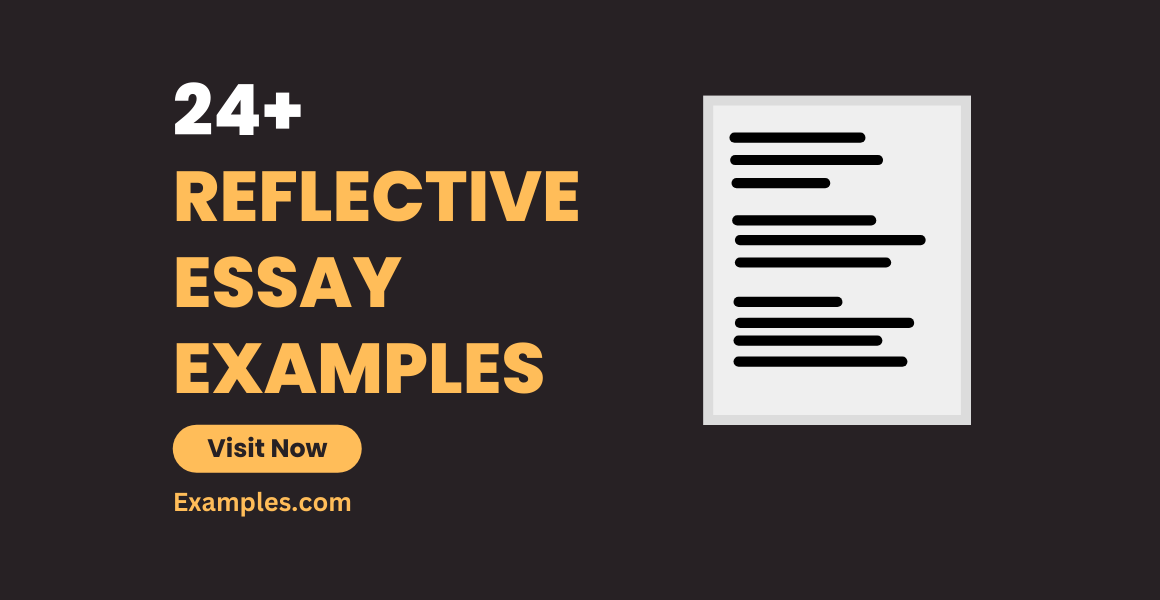
Sometimes, it is our experiences that startled and challenged our own voyage that strengthens and improves us to be the best versions of ourselves. If your life experience greatly moved you, there is a certain essay that allows you to compose your own endeavor. In this article, read through because we will be discussing the fundamentals of writing a reflective essay.
They say that being wise is better than being knowledgeable. Wisdom is acquired through reflection of one’s experience as well as of the environment. The more we reflect the more we become aware of ourselves. We become mindful of our existence as well as the meaning of life and all the things that surround us. Here we present different formats of essays like essays in doc .
Reflective Essay Outline Template
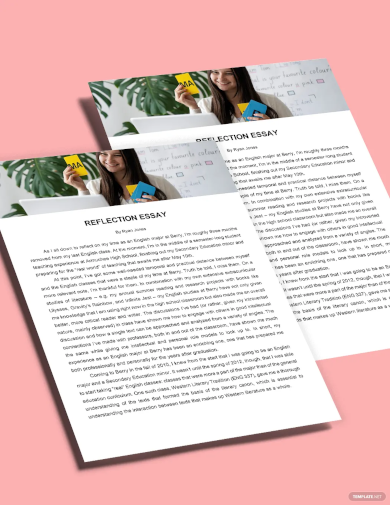
- Google Docs
Size: 188 KB
Reflective Essay About Life Experience
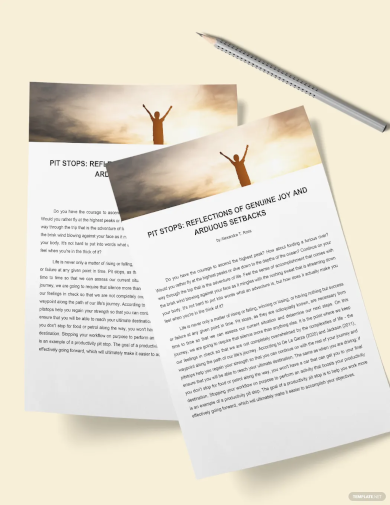
- Apple Pages
Size: 142 KB
Reflective Essay Template

Size: 237 KB
Self Reflective Essay Template
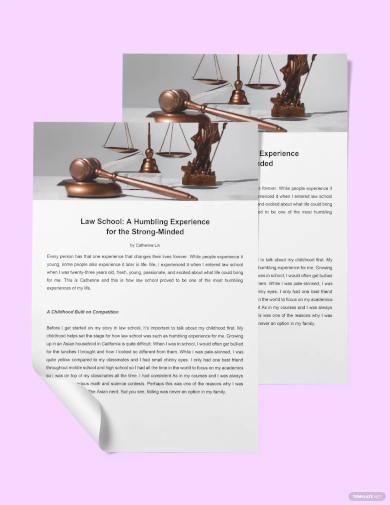
Size: 114 KB
Personal Reflective Essay Template
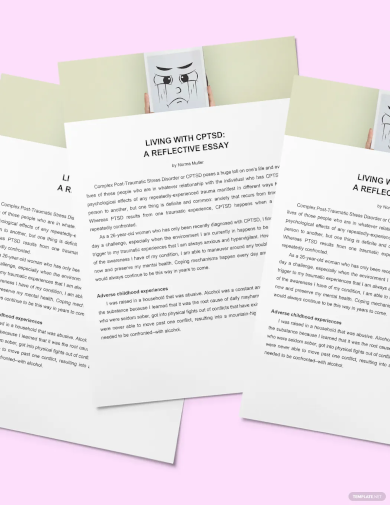
Size: 126 KB
Personal Reflective Sample
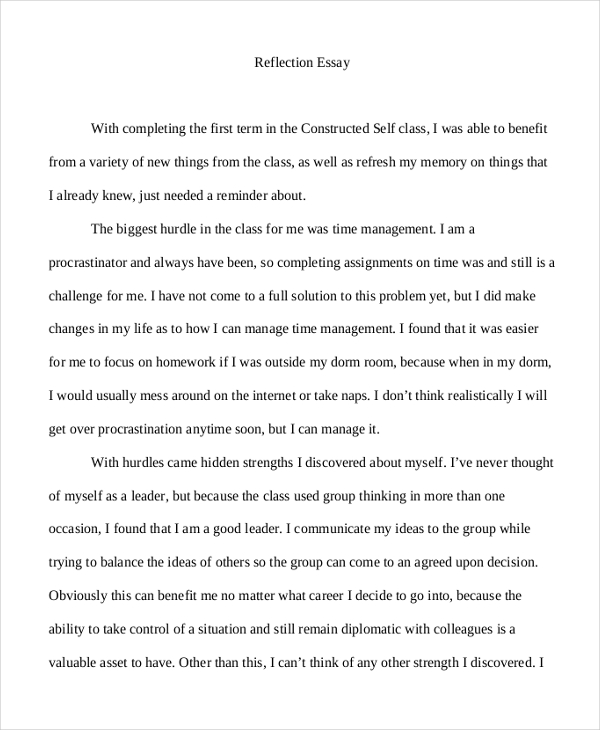
High School Essay
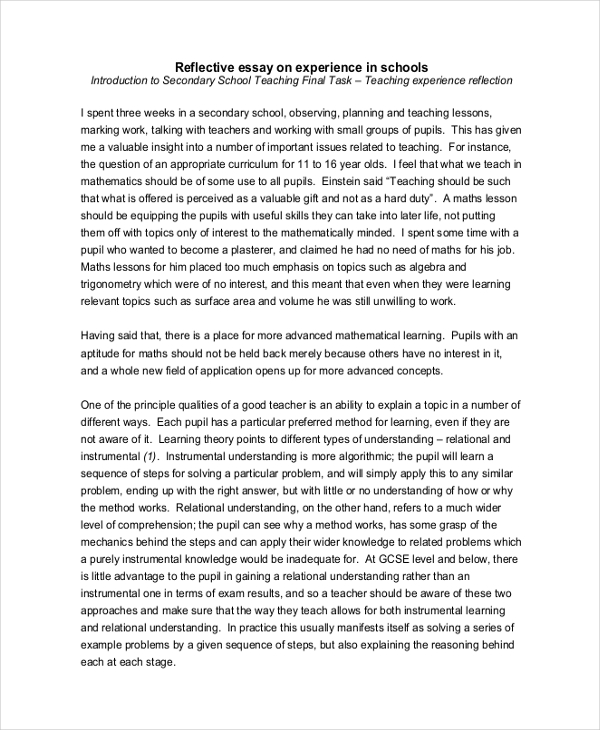
- PDFReflective Essay Example Reflective Essay Example Reflective Essay Example
Size: 102 KB
Reflective Essay Outline
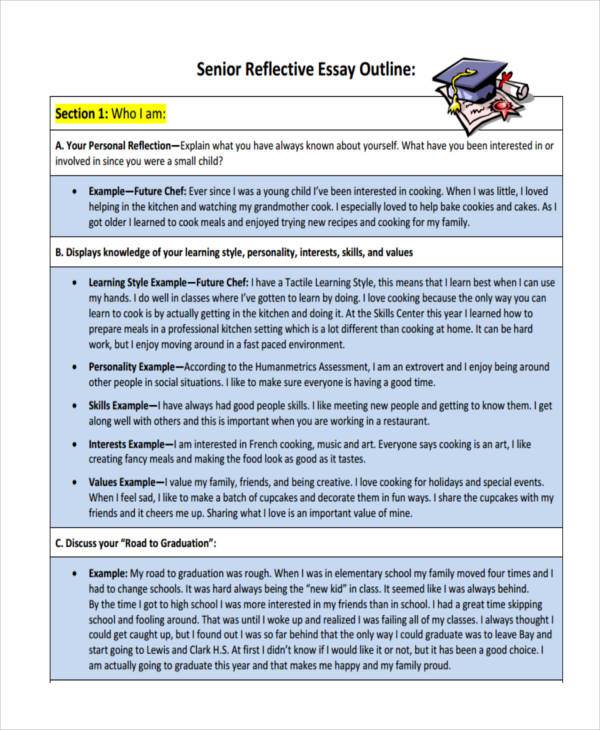
Size: 247 KB
Student Reflective Example
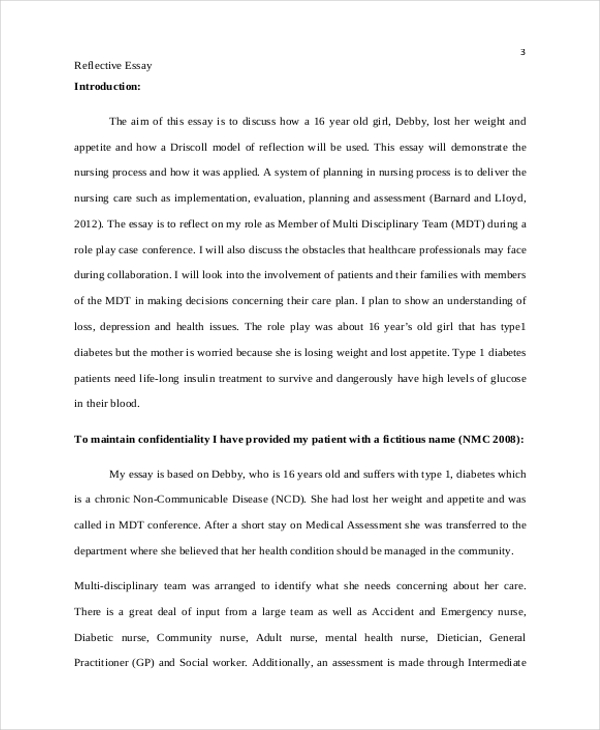
Size: 42 KB
Communication Reflective
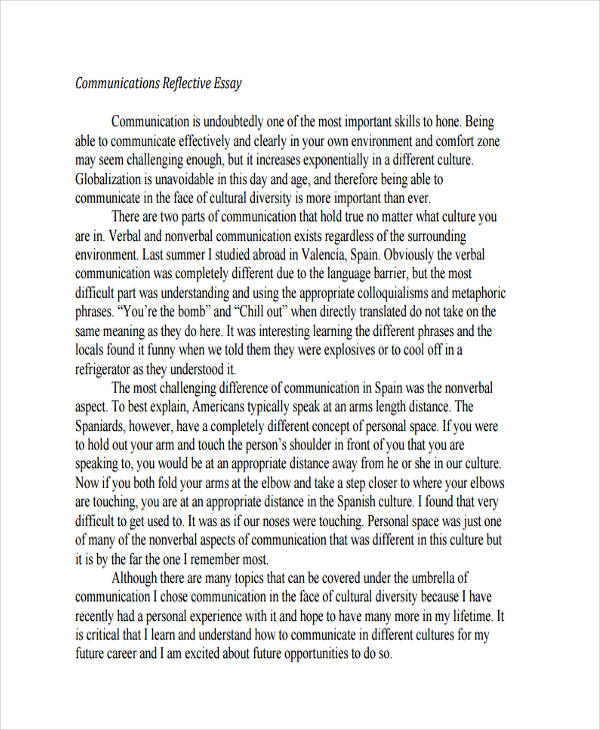
Size: 66 KB
What Is a Reflective Essay?
A reflective essay is a written piece of literature that focuses on presenting and narrating a person’s experience and how it becomes an instrument towards a change of perception in life.
It is a way for a writer to share an important event in his/her life and how it affected him/her so that others may learn something from it. Reflective writing root on life-changing events. The writer shares a specific experience, provides a narration of the incident including the material elements. It offers a realization so that others who may have had the same experience can draw out a shared mutual lesson from it.
How to Write a Reflective Essay
To write a reflective short essay , you need to have the right disposition as well as the momentum. Remember that you are not just writing to say something but to share an important lesson in life.
1. Think of an important event. What you will be writing on your reflective essay is something that is rooted in your own personal experience or encounter of something. Think deep and concentrate. You may also see personal essay examples & samples.
2. Introduce your topic. In your introduction, write the concrete event or experience that you want to share. Pattern it in a story form.
3. Develop your point. Write the main content of your essay with at least three to five paragraphs supporting your main topic.
Final Reflective Essay
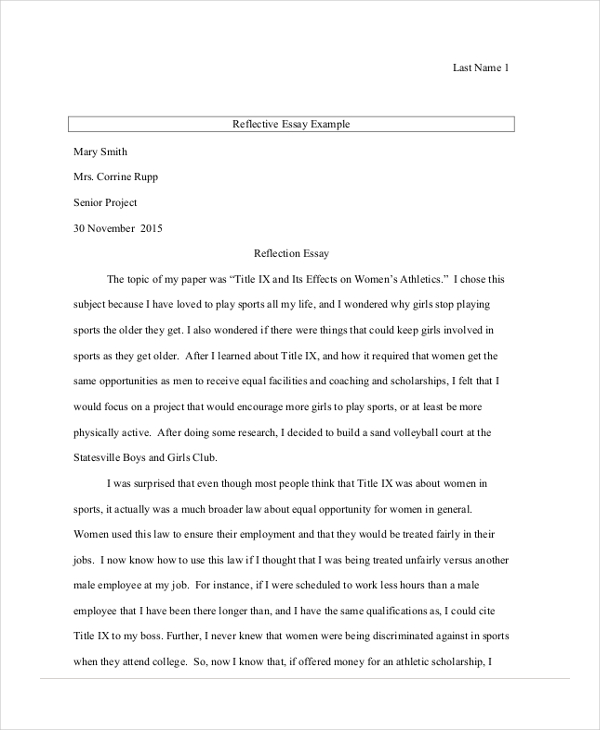
Size: 49 KB
Internship Reflective Essay
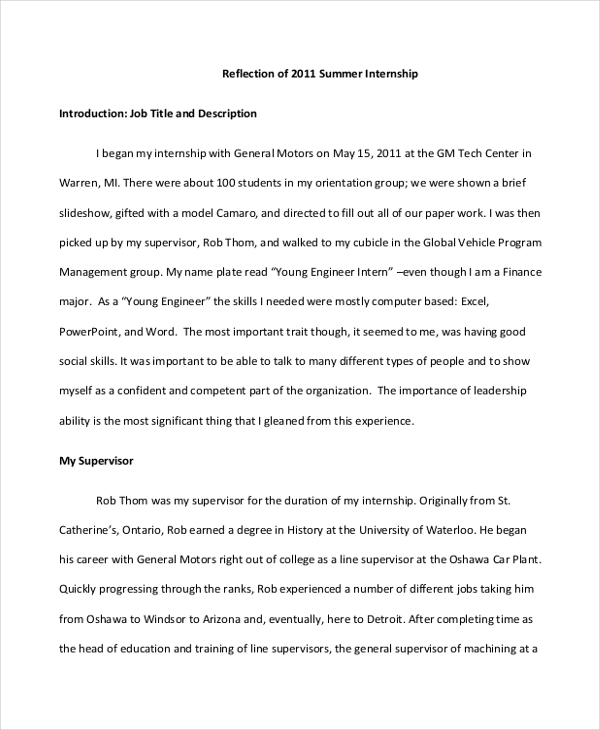
Size: 285 KB
Leadership Reflective Example
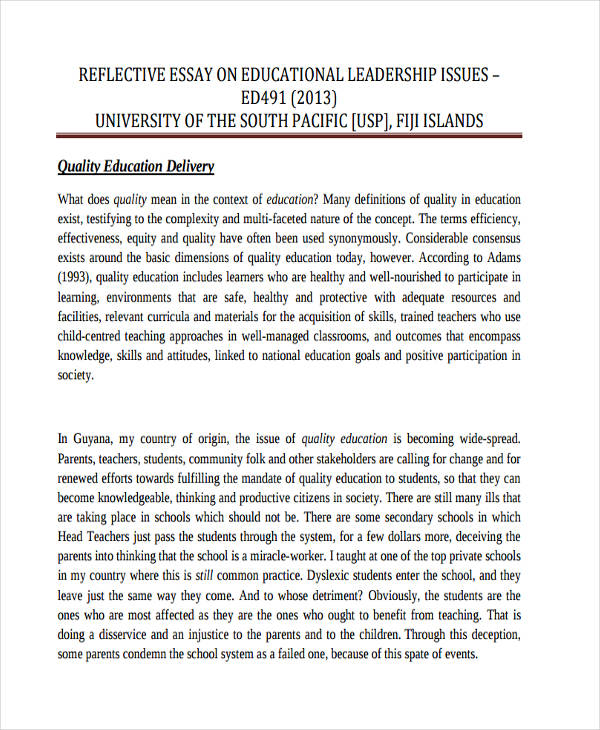
Size: 634 KB
Nursing Reflective Essay
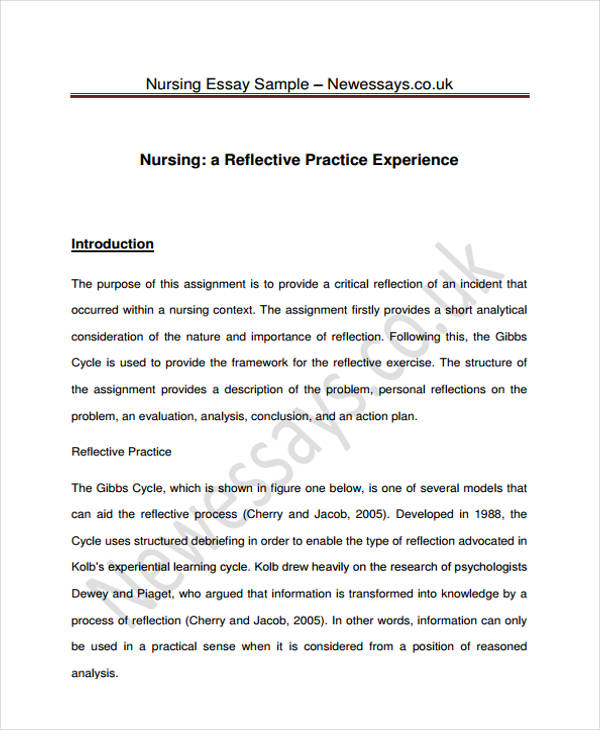
Size: 331 KB
Research Reflective Example
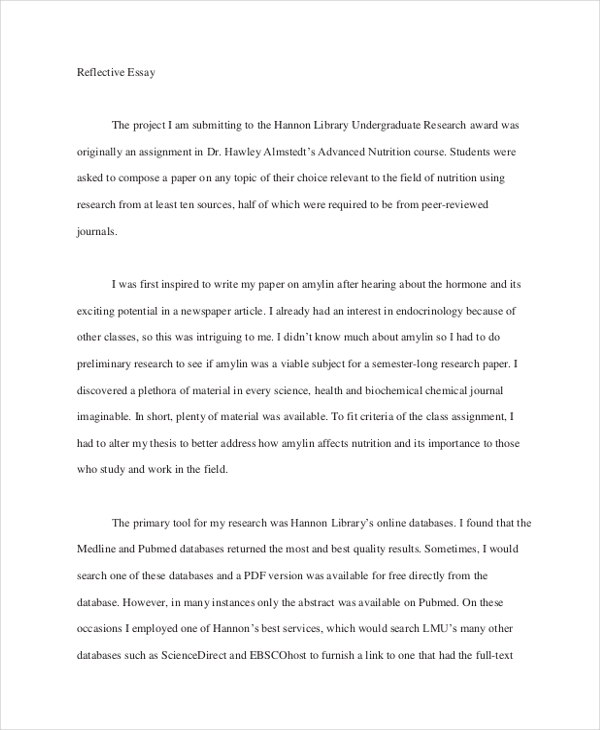
Size: 155 KB
Tips on Writing a Reflective Essay
Writing a reflective essay is not persuasive writing where you have to convince your readers to accept your opinion. You simply have to share an experience.
1. Write a draft. Do not jump hastily onto formal writing . Write a draft where you can create a bulleted list of the things that you want to share.
2. Think logically. When presenting a story, do it in a chronological manner so that your readers can understand the plot. Do this as well when presenting your ideas.
3. Create a summary. Use a summary writing to briefly state your insights and to give your final thoughts of the topic.
Importance of a Reflective Essay
In this era that we currently live in, personal reflection can be considered a thing of the past. Because of the gradual change and development of the things around us, we find it difficult to pause and reflect on the things that happen to our lives. You may also see academic essay examples .
The importance of writing an essay is to present to us the things that we rarely encounter in our day-to-day activities. In this time when material things are all that mattered, we have become unappreciative of the abstract things like love, compassion, and mercy. We cannot learn these things from those electronic gadgets that keep us busy.
How to Start a Reflective Essay Correctly
As mentioned above, a reflective essay presents and narrates the experience of a writer and how it changes the way he/she perceives life. In a simpler sense, it talks about how the author reflected on a certain adventure. As an essayist, since it’s you who bears the story and lessons, you are the one who is responsible for expressing it.
Just like any other composition, it’s your introduction that catches the attention of the reader. Thus, in order for your essay to be fully read, it is important to start your essay remarkably. If you find writing an introduction for your reflective essay challenging, don’t worry, you’re not alone. In this section, we are going to slowly tackle the ways to compose a compelling introduction.
1. Being catchy is the key.
In writing your reflective essay, you must start with something that would captivate the readers right away. Since the purpose of the introduction is to grab some attention, you may include some unique and interesting facts or beliefs. In this part, showcase your creativity by adding an introduction that is written in a bizarre manner and not those that depict cliché experience. You may also utilize a highly moving quotation or a dialogue that would also be appropriate for your reader.
2. Write the thesis statement in one sentence.
A thesis statement refers to the sentence that carries the topic being discussed in the whole essay. Therefore, it bears the central idea in which your essay revolves around. In writing your own essay, construct this statement in a clear and concise sentence. In this way, the reader will have a better grasp of your topic and would be clearly oriented on what you want to convey. In most cases, thesis statements are written at the end of the introduction.
3. Stick to the first person POV.
Remembering that this essay is subjective and depends on the author’s interpretation, it is important to use the first person point of view. By using this POV, it would be easier for you to convey your thoughts and opinions, and it would engage you to the readers like you’re telling a story in person. The first person involves the pronouns I , me , my , and mine .
4. Keep it brief.
When it comes to writing your own essay, you must perceive what your readers feel or see in reading your composition. Always put into mind that readers also have their own time to spend, and without a mark in the writing industry, people won’t invest much time on reading your essay. Thus, it is important to keep your composition concise. You can utilize a paragraph of five to ten sentences in your introduction. Using this number of sentences, you must already express a complete and clear thought of an essay that is worth reading.
Reflective Essay Example
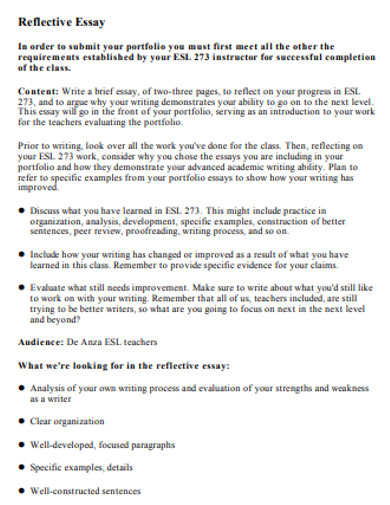
Size: 73 KB
Reflective Essay Assessment
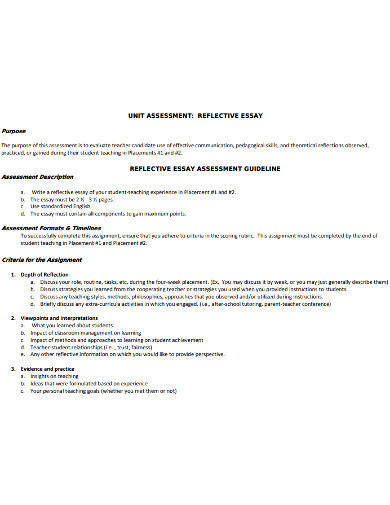
Size: 99 KB
Reflective Essay Format
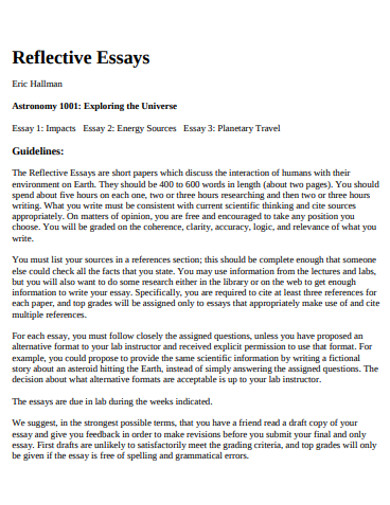
Size: 278 KB
Basic Reflective Essay
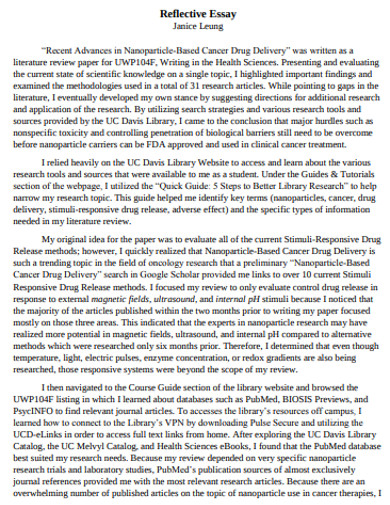
Size: 81 KB
Reflective Final Essay
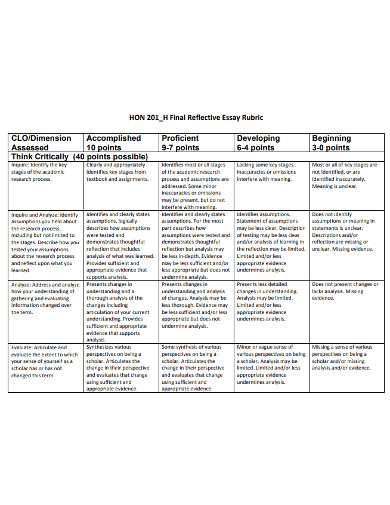
Size: 85 KB
Sample Reflective Essay
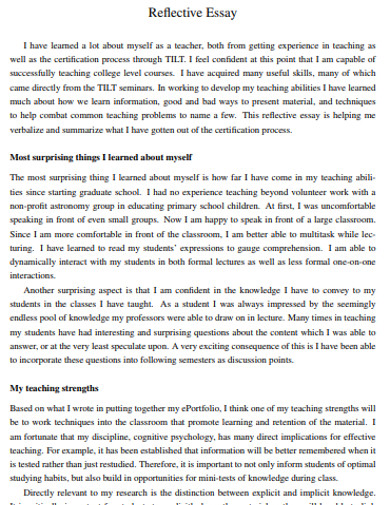
Size: 38 KB
Simple Reflective Essay Example
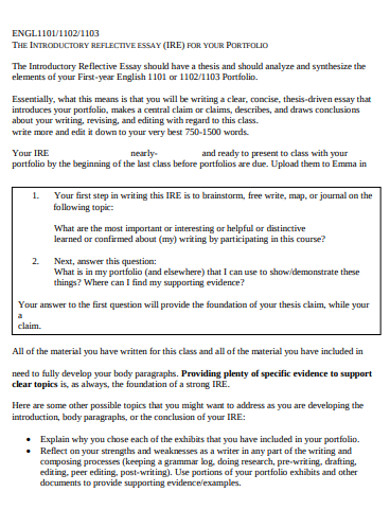
Size: 193 KB
Standard Reflective Essay
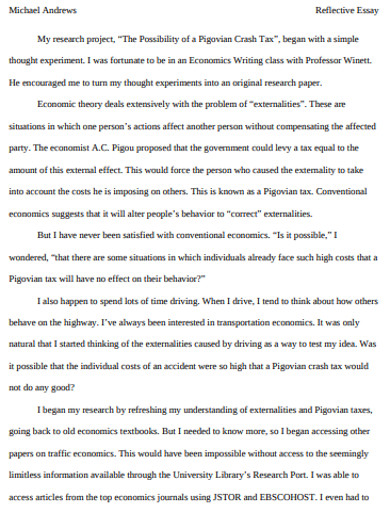
Professional Reflective Essay
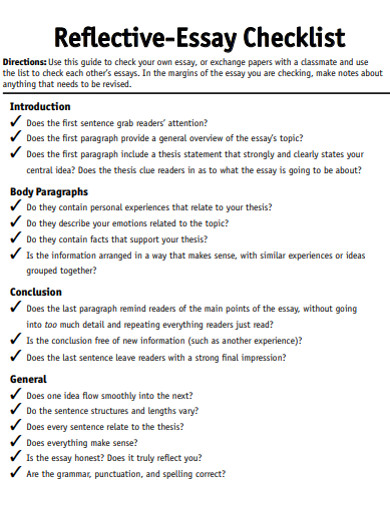
Size: 264 KB
Sample Reflective Essay in PDF
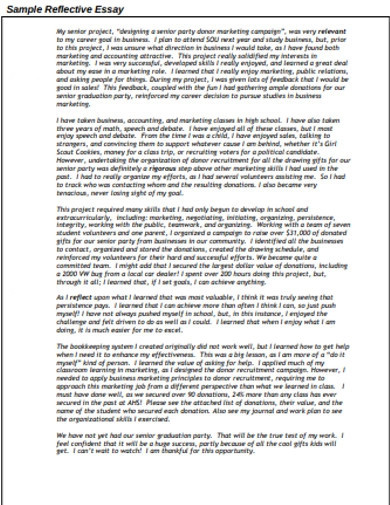
Size: 26 KB

Reflective Essay Generator
Text prompt
- Instructive
- Professional
Write a Reflective Essay on your most meaningful learning experience.
Create a Reflective Essay about a time when you showed leadership.

- Online Course
8 Tips For Writing A Great Reflective Essay (With Examples)
Memories, hopes, disappointments, and curiosity run through your life.
By writing a reflective essay, you can capture some of these ephemeral emotions and make sense of who you are. Below, I share eight tips (and a few examples) that will help you do it in a better way. You may have to write a reflective essay as a part of an academic assignment or a college paper. Or perhaps you want to create it for yourself and never show it to anyone. Regardless of the reason, after reading this article, you will hopefully become better at it. They helped a lot of students over the years, so you may check them out.
Here’s how to write a great reflective essay:
1. first, what is a reflective essay.
A reflective essay is a piece of writing in which you analyze your personal experience, reflect on how it changed your life, and what conclusions for the future can you draw from what you’ve learned. It’s a “know thyself” type of essay. The goal here is getting self-knowledge, by stopping to think about your memories, your values, and where you want to go from the present moment onward. By writing your thoughts down, you pursue some kind of deeper truth, about yourself and the world.

2. The power of writing introspectively
Many great men and women (like Charles Darwin or Frida Kahlo ) had a habit of keeping a journal. This seems to be forgotten these days as we record everything through our mobile devices. But the habit of introspective writing and journaling helps you get in touch with your inner self and even improves your mental health. The reflective essay serves a similar purpose. It lets you search for meaning in your life and lets you discover the underlying causes of your actions.
“Life can only be understood backward, but it must be lived forwards.” – Søren Kierkegaard
3. How do you start your essay?
You may start with an introduction of experience, an event, or a memory on which you’ll reflect. If your topic is “a life-changing incident you had when you were a child,” you could start with: I used to live on a sunny farm with my parents and grandparents when I was young. A few days after I turned six, something happened that would alter the course of my life forever. I’m fifty-two as I’m writing this…
This beginning has certain elements that make it effective:
- Introducing the setting and putting the experience in context.
- Hooking the reader by building curiosity and a story.
Here’s another way to start (this excerpt is taken from Didion’s “ On self-respect ”): Once, in a dry season, I wrote in large letters across two pages of a notebook that innocence ends when one has stripped of the delusion that one likes oneself. In reflective writing, you don’t have to follow any strict guidelines or rules. Follow your heart, put some emotion into it, and you’ll create something of value for yourself and others. Start at the beginning, in the middle, or at the end – as long as it’s coherent, you’ll be fine.
“When I discover who I am, I’ll be free.” – Ralph Ellison

4. Learn how to structure your essay
In terms of length, it all depends on your assignment, but usually, the reflective essay has between 300 and 700 words . It has a rather informal structure and the use of language. After all, you’re drilling into your personal experiences, and often, this requires a poetic turn of the phrase. You’re more than welcome to use a wide range of advanced vocabulary .
Introduction
In this part, you set the tone for your reflection. You implicitly or explicitly say what will you reflect on, and what prompted you to do that. If you’re writing an academic paper , you’ll have to be more direct and for example, say: “What follows, are my reflections on what I’ve learned about life during the first year of college”.
In this part, you talk about your actual experiences, memories, and important events in your life. But the purpose is not just to say what happened – that’s a descriptive essay’s job. The true goal here is to ponder the significance of your experiences and think about how they changed you and what you’ve learned from them. Here you can share concrete examples of changes that took place in your life.
Here, you sum up your essay and leave your audience with a final thought. Look ahead into the future and write about how your experiences are going to affect your life from now on. What’s the direction you’re going to take? What is there to look ahead to? You may also look backward and see how different you were in the past, compared to now. “I think it’s good for a person to spend time alone. It allows them to discover who they are and to figure out why they are always alone.” – Amy Sedaris
5. Create an outline for your essay
As with most writing assignments , the work begins with ideation and then creating some sort of outline . Here’s a simple process you can use to get everything ready before you start writing: a) Scan your mind in search of powerful experiences, meaningful memories, and thoughts about your past. This will serve as a raw material from which you’ll sculpt a piece of prose. b) Consider the attractiveness of your topic from the reader’s point of view. You certainly don’t want to bore anyone, so pick something interesting, but important. c) Organize your essay and divide it into a couple of paragraphs. Each paragraph should contain one important idea. d) Decide in which sequence you would like to share your ideas. Put some logic and chronology behind it. e) Jot down any side notes included in the essay. It’s always better to have an overabundance of material.
“Your visions will become clear only when you can look into your own heart. Who looks outside, dreams; who looks inside, awakes.” – C.G. Jung
6. The essay-writing process
The best piece of advice on that is to avoid cliches. It might be hard to do this at first, but decide to speak your truth. Talk about things and feelings unique to you and your life. It’s easy to regurgitate what someone else had said before because it’s a safe territory. Your goal is to open doors to which only you have the keys.
Once you have the idea, you can follow a simple process:
- Write the first draft as quickly as you can (no editing or looking back here)
- Reorganize the first draft if necessary
- Edit for clarity (throw out everything unnecessary)
- Accept that it will not be perfect, and publish it (or keep it to yourself)

7. How to pick the right topic for your essay
If you’re writing an assignment, you’ll probably receive the prompt from your professor. If that’s the case, follow it diligently. This may be something like: a) Reflect on what you learned during your first year of high school. b) Think about your favorite book and how it changed your life . c) How did your writing skills change over the years? And why? Or it might be something really specific like Write a two-page reflection paper on the Adventures of Tom Sawyer by Mark Twain. Here, it’s not only about your personal experience, but about your interaction with a specific text, event, play, or movie and the effect it had on you. But what if you want to write an essay on your own? Which topic would you choose then? First, pick something meaningful to you. Second, pick something that you know well. Third, pick something that you want to explore and get deep into.
Here’s some more inspiration in the area of topics:
Personal reflection:.
- What was the hardest thing you’ve ever done and how did it change you?
- How has your relationship with your parents changed over the years?
- What did you use to do a lot in the past, but aren’t doing now?
- What was the most creative act you’ve ever done?
- What was your favorite game or toy when you were a child?
- What did you want to become when you were small?
- How did you overcome your limits?
- What was your biggest failure and how did you come back on your feet?
- What are the things from the past that are still haunting you?
- What gives you the biggest sense of joy in life?
- What is your passion and how has it shaped your life?
Reflection on life and meaning:
- What is the meaning of friendship?
- What is to be done with the time you have in your life?
- What are the values that make up a good life?
- Is it possible to find the ultimate truth about anything?
- Can you know thyself?
- What should every human do during their lifetime?
Reflection on events:
- What was your most exciting trip and why?
- Have you ever had a mystical or psychedelic experience?
- How did World War 2 change the collective psyche of humanity?
- What was your favorite musical concert and why?
- Was there any rite of passage you went through? What was the meaning of it?
You may also consider other great essay topics submitted by the users of Quora.
“Reflect upon your present blessings — of which every man has many — not on your past misfortunes, of which all men have some.” – Charles Dickens

8. Learn from the masters
Montaigne was the father of the essay as a literary form. He was the first writer to use informal tone, colloquial language, and rather prosaic themes to get to the deeper truth about human nature.
I recommend you check his essays for inspiration, along with other masterworks:
- The Essays – by Montaigne
- Shooting an Elephant – by George Orwell
- On Self Respect – by Joan Didion
- Meditations – by Marcus Aurelius (it’s a philosophical work, rather than an essay, but the quality of “Meditations” is too high to be overlooked).
- Once more to the lake – EB White
And here are a few books filled with great reflective essays:
- A room of one’s own – Virginia Woolf
- Walden – Henry David Thoreau
- A collection of essays – George Orwell
- Arguably – Christopher Hitchens
- Consider the Lobster and Other Essays – David Foster Wallace
And here you may find a huge list of 450+ essay books on Goodreads.
“Once we accept our limits, we go beyond them.” – Albert Einstein
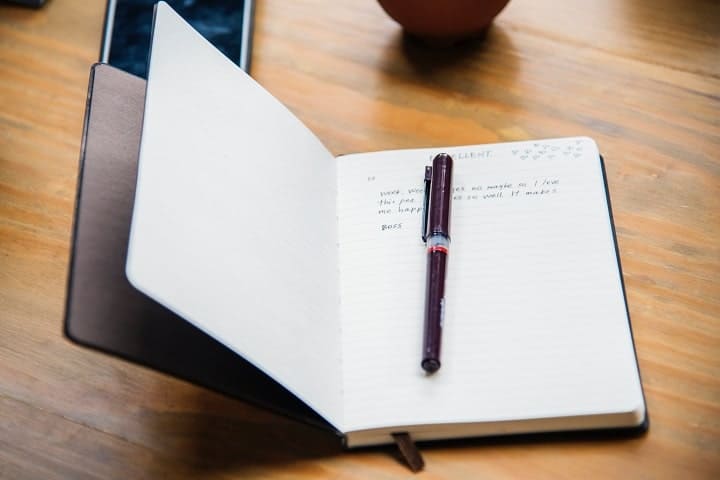
Example #1 of a reflective essay:
The misgivings about the high school football.
Football (soccer) was on the pedestal during my high school years in Poland. You were not judged by the color of your skin (because everyone was roughly the same color) nor by the contents of your character. The worth of a human being is measured by the ability to score goals. Each player had to find their niche in the dominant hierarchy of the pitch. It all started with the selection of players. The gym master would choose two captains at the beginning of the match, and they would choose their teammates. One by one, the best players got picked, and as we went down the line, we were left with the wretched souls, the worst, the smallest guys, or the fat ones, whose self-esteem was shattered from the beginning, simply because they were picked last. But there was a ladder within a ladder. Some players, perhaps in the lower echelons would be defenders, some would be proud midfielders, pushing the ball forward and creating “situations”. Some were the goalkeepers who were chosen for the job because they couldn’t play ball, or because they were specialists, sporting keeper gloves, and getting admired for their technical skills. But the true apex of the hierarchy was occupied by the attackers. The guys who could push through others and ram the ball through the goalkeeper were the true heroes of the field. This self-generated order of youthful self-worth and self-concept was brutal, as it was instructive. Each football match was a psychology class and a lesson in the ways of the world that outweighed math, history, or geography by orders of magnitude. We could witness the natural constellation of humanity based on their genetic makeup and their willingness to face their fears.
Here’s a second, shorter sample of a reflective essay:
The sources of love for instrumental music..
There’s a question I can’t quite answer. Why do I love instrumental music so much? And why, and I’m especially enamored with the music of the East? The Persian, the Indian, the Afghan, the Japanese, the Turkish, the Kurdish, the Arabic? Since I first discovered these musical notes, my life was never been the same. Recently I watched a great documentary about Quincy Jones where he said he touched his first piano at twelve, and these first few taps of fingers defined the rest of his life. Isn’t that strange, that in reality, we don’t choose things? The things choose us. Where do these natural inclinations come from? It must be our environment, our personality, our natural talent. But the other part seems mysterious, like some sort of cosmic accident. I first heard about the Oud when reading “My Name is Red” by Orhan Pamuk. I instantly went online to hear this instrument and from there on, I discovered dozens of beautiful instruments such as tar, setar, sitar, buzuq, sarod, tabla, rebab, shakuhachi, quin, biwa, to the goddamn gamelan drums. Hearing the esraj in a tower of the ancient Indian fort in Jodhpur melted my heart. It was as if this melody was constructed just for me like I’d heard it before. Perhaps in another life.
Looking backward, moving forward
There are certain milestones in your life: finishing high school, falling in love for the first time, your first journey abroad, the first kiss, the first psychedelic trip, graduating from the university, getting your first job, getting married, having children… Each of these brings something new and unexpected and makes you grow as an individual. But you can run through life and never reflect on how it all changed , how silly and incompetent you were just a few years ago. And how you’ll think the same thing about the present in a few years. Perhaps you should compose a reflective essay and think about all of this, and about what’s coming. Next up, you may want to explore a list of the best essays of all time .

Digital marketing course: Join my full AI Marketing course, with over 6h and 30 minutes of video lessons and 5 bonuses and learn the skills necessary to thrive as a marketer in the digital era.

Rafal Reyzer
Hey there, welcome to my blog! I'm a full-time entrepreneur building two companies, a digital marketer, and a content creator with 10+ years of experience. I started RafalReyzer.com to provide you with great tools and strategies you can use to become a proficient digital marketer and achieve freedom through online creativity. My site is a one-stop shop for digital marketers, and content enthusiasts who want to be independent, earn more money, and create beautiful things. Explore my journey here , and don't miss out on my AI Marketing Mastery online course.
- AI Content Shield
- AI KW Research
- AI Assistant
- SEO Optimizer
- AI KW Clustering
- Customer reviews
- The NLO Revolution
- Press Center
- Help Center
- Content Resources
- Facebook Group
Reflective Essay Introduction Structure – an Effective Guide
Table of Contents
Writing an essay is daunting; what’s even more challenging is writing a brilliant introduction.
An essay introduction sets the tone for the entire piece. It is a concise overview of the key points and makes the first impression of your essay. A good reflective essay introduction structure is clear and concise, sparks compelling thoughts, and stimulates the readers to continue reading.
A reflective essay introduction should begin with a hook and an insight into the topic of your reflection. It should also include a thesis that informs the reader about your viewpoint.
Not everyone is equipped to write a good essay introduction. But with some guidance, you’ll be able to write a great one. This guide discusses the reflective essay introduction structure, highlighting some expert tips for crafting a brilliant introduction.
Reflective Essay Introduction Structure
A reflective essay is a personal reflection, a written narrative from the author’s experience and opinion. The term “reflective” suggests that the writer examines his or her experiences, opinions, and thoughts.
In reflective essays, the author recounts a particular life experience and explores how he or she has learned or changed from those experiences. Such papers are written in the first person. Like any other essay, a reflective essay begins with an introductory paragraph.
The introduction provides a summary of the entire piece . It begins with a hook that attracts the reader’s attention and grabs their interest. It ends with a thesis statement that gives the reader a clear, concise idea of what the essay will be about.
How to Write a Reflective Essay Introduction
The introduction is the frame of reference for the essay – it sets the tone for the piece. It should introduce your reader to the essay’s topic and focus. Here are the main parts of a reflective essay introduction .
1. Begin With the Hook
A hook is a solid prompt to convince readers to take a closer look at your essay. Begin with a powerful opening statement that grabs the reader’s attention and promises a fascinating insight into the essay. Highlight the exciting aspects of your paper in the first sentence to gain instant reader attention and hold the reader’s interest.
Your essay’s hook can come in the form of a quote, a rhetorical question, or a personal anecdote. It may seem a little daunting or simply inaccessible. However, use your imagination, and you should be able to come up with something that connects with your audience.
2. Provide Background
Provide more details on the subject matter. In one to two sentences, describe the main features of the topic you’ll be discussing.
Your description should be based on your opinions — what you experienced or how you felt. Take your time to provide enough information, so the reader gains a complete and thorough understanding of what you’re about to present.
3. Present Your Thesis
The thesis statement is a summary of the essay’s main points. Present an overview of your experience and summarize how it influenced you significantly.
Don’t give away too much information; you have the essay’s body to do that. One sentence that concisely summarizes your thoughts about the topic, and the lesson you learned from the experience is sufficient.
Tips for Writing a Brilliant Reflective Essay Introduction
A good reflective essay introduction must create an excellent first impression. Here are some tips for crafting a compelling introduction.
- Read other reflective pieces in newspapers or magazines to get familiar with the tone and format of a typical reflective essay introduction.
- Draft out a roadmap and stick to it. Write down the first draft, and return later to edit anything you don’t find interesting. You might never find the perfect first sentence, so record your feelings and thoughts on your experiences and write whatever comes to mind. After a few edits, you’ll surely have the perfect introduction.
- Write your introduction and every other essay part using the first-person narrative. Use a personal tone that is reflective of your personality.
- Begin your introduction with a hook. You may consider starting with a quote or a short anecdote to grab the readers’ attention and make a personal connection with them.

The Bottom Line
The introduction of a reflective essay should begin with an attention-grabber, a line that lures the reader in and keeps them interested.
It should also provide background information and a setting for the following discussion . A thesis statement that summarizes the main points and focuses of the essay should be presented at the end of the introduction.

Abir Ghenaiet
Abir is a data analyst and researcher. Among her interests are artificial intelligence, machine learning, and natural language processing. As a humanitarian and educator, she actively supports women in tech and promotes diversity.
Explore All Essay Intro Generator Articles
The different ways to start a comparative essay.
Some writers intend to compare two specific things or ideas through their articles. They write these essays to compare and…
- Essay Intro Generator
Know The Best Way to Start an Expository Essay
Are you into writing essays that tackle a still-unknown fact? Do you know how to write an expository essay? Before…
Writing an Opinion Essay? Read This First!
Students are required to express their opinions on a topic in an opinion essay. Pertinent illustrations and explanations support their…
Identifying the Best Transitions to Start an Essay
A typical academic assignment is the essay, which must meet certain requirements in order to be written properly. Even students…
How to Write Introductions for Synthesis Essays
One of the most exciting assignments you could have is writing a synthesis essay. For a college or university student,…
How to Write Introductions for Music Essays
Music is food for the soul, or so they say. A music essay analyzes or describes a piece of music,…

How to Write an Introduction to a Reflective Essay

How to Write a Speculative Essay
A reflective essay incites the writer to reflect on topics from the framework of personal experience. Reflective essays must have a clearly defined focus with a consistent point of view. They should provide background information and include narrative elements such as plot, characters, setting and conflict. Reflective essays should present events in a clear format such as chronologically. Although they differ from other essays in their content, they follow the same basic format.
Introduce and define the essay topic. The first sentence should be strong to enable the reader to become immersed in the topic. Do this by providing interesting details and stating personal feelings and/or expectations. Provide background and personal information in the context of the essay topic. The point of view of your essay can be in first or third person but should be consistent.
Provide the purpose or rationale for writing the essay. Ensure that your stated purpose is clear as it will anchor your flow of ideas to the topic. Although this does not have to be persuasive or argumentative, your reader should be able to get a sense of why you chose the topic.
State your thesis about the topic. Your thesis should encapsulate your viewpoint about the topic. Make this statement realistic and able to be substantiated with information provided in the body of your essay.
Edit your introductory paragraph at the completion of your essay. Check that your flow of ideas is logical and you have avoided any ambiguity about the topic, rationale and thesis. Ensure the paragraph is free of grammatical, spelling and punctuation errors.
Related Articles

How to Write an Anecdotal Essay

How to Write an Introduction to an Analytical Essay

How to Write a Controlling Idea Essay

How to Write a Thesis & Introduction for a Critical Reflection Essay
How to write an essay with a thesis statement.

What Is a Bridge Statement in English Homework?

Should a Thesis Statement Be Included in an APA Style Outline?
How to write a definition essay.
Emily Rose is a full-time freelance writer who began writing professionally in 2010. Rose's interests include psychology-driven topics such as mental health, human relationships, addiction and stigma and discrimination. She has a bachelor's degree in arts from the Queensland University of Technology and is currently obtaining a degree in creative writing (nonfiction narrative) at Simon Fraser University in British Columbia.
Personal Reflection
6 July 2023
last updated
Reflection is an educational concept in learning, which determines the success level of scholars. Basically, teachers use the process to examine how students relate their knowledge to real-life situations. Besides, people use these papers to express their level of comprehension. In particular, an effective personal reflection should have an informative introduction, a supportive body, and a conclusion.
Introduction
Working papers contain an opening section that gives a clear picture of the details presented. For instance, the introduction provides an exciting opening and understanding of the paper. In this case, one should use a catchphrase to grab the reader’s attention in personal reflection. Besides, the student must provide background information about the theme. Also, successful learners present actions, thoughts, or characters that form the basis of the essay. In turn, individuals develop an effective thesis statement . Thus, the introductory paragraph sets the context of the reflection composition.
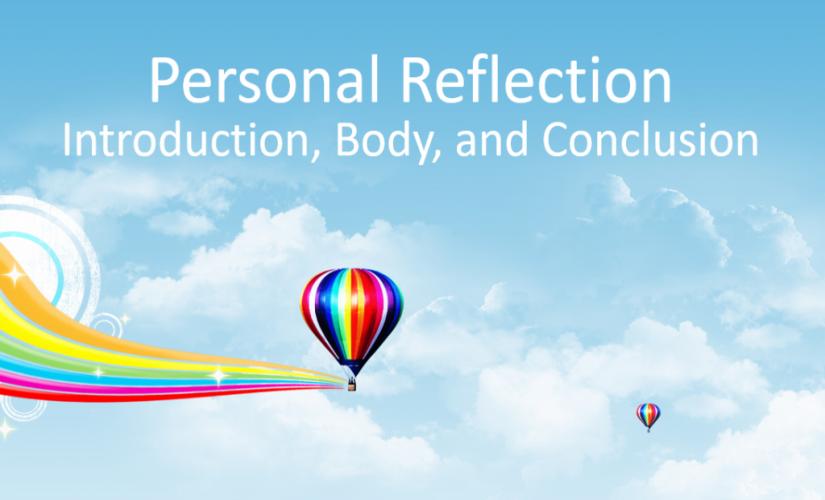
Body Paragraphs in Personal Reflection
The body of personal reflection must describe one’s experience objectively. For example, students should identify questions to answer, which relate to the actions or thoughts presented. In practice, learners identify the event, place of occurrence, and parties involved. Also, the exercise helps readers to understand the significance of the paper. Therefore, students should provide a clear description of the subject.
Examining Points
Quality body paragraphs of personal reflection examine the matter presented. For instance, individuals should identify the influence of the event to his comprehension. In this case, one should relate the subject matter to knowledge acquired in class. Besides, successful students identify how they can embrace the experience in their daily lives. In turn, a detailed exploration of the topic allows people to express what they seek to achieve. Moroever, the author should suggest the factors that promoted or discouraged the expected impact. Thus, scholars should include paragraphs that scrutinize the subject.
Presenting Lessons
Body paragraphs should articulate what learners gain from experience under the investigation. For instance, students should deliver thoughtful essays. In this case, people should identify what they learned and the method used. Besides, they determine why the topic matters enhance the overall quality of the work. In turn, one should consider the possible actions that readers should adopt in light of the theme. Therefore, the use of personal reflection must articulate learning.
Conclusion Part
The conclusion of personal reflection should leave the audience with a lasting impression. In practice, one should remind the reader of everything presented within the other sections. Basically, the last paragraph must relate to the introduction and thesis statement. In this case, the method creates a frame around the paper. For instance, the author must avoid introducing new ideas. Also, this approach helps to bring adequate closure to the essay. On the other hand, scholars should provide recommendations on how people can utilize the information. Therefore, the writer should end the paper and motivate the audience to adapt their arguments.
Summing Up on Personal Reflection
In conclusion, people use personal reflection papers to represent the implication of events or subject matter. Basically, effective essays should have an informative introduction, which sets the background of the paper. Besides, the opening section influences readers to read through. In turn, people describe, examine, and articulate the events or ideas presented. Finally, the conclusion should summarize the main points and bring the paper to a closure.

IMAGES
VIDEO
COMMENTS
Introduction As is the case with all essays, your reflective essay must begin within an introduction that contains both a hook and a thesis statement. ... - Write using the first-person narrative, ensuring that the tone of your essay is very personal and reflective of your character. - If you need to, refer back to our notes earlier on ...
A reflective essay is a type of written work which reflects your own self. Since it's about yourself, you already have a topic to write about. For reflective essay examples, readers expect you to evaluate a specific part of your life. To do this, you may reflect on emotions, memories, and feelings you've experienced at that time.
Benefits of writing reflective essays for personal growth and development; II. Choosing a Reflective Essay Topic: ... The goal of the introduction in a reflective essay is to capture the reader's attention and provide them with the necessary background information and context related to the topic. It should set the stage for the reflective ...
Reflective Essay in MLA Format. Times New Roman 12pt font double spaced; 1" margins; The top right includes the last name and page number on every page; Titles are centered; The header should include your name, your professor's name, course number, and the date (dd/mm/yy); The last page includes a Works Cited.
4. Writing the Body. Write the body of your essay, which should include the personal reflection, description of the experience, analysis of the experience, evaluation of the experience, identification of key learning, and planning for future action. Make sure to use specific examples and details to support your reflection. 5.
Step 6: Create an introduction of your reflection paper. Step 7: Think what you will include in the main body of your text. Start writing your body paragraphs. Step 8: Diversify your text with all the necessary details to make your readers see a clear picture of the environment in your story.
1. Choose Your Topic Carefully. If you are given the freedom to choose a topic and don't have any idea regarding it, the best way is to brainstorm and research some trending and good topic ideas. Unfortunately, a common mistake when writing a reflective essay is to choose a topic that is too broad or too narrow. 2.
Seeing reflective essay examples can help you understand how to accomplish a reflective essay writing assignment. View examples of reflective essays. ... Self-reflection is a personal experience. Therefore, the tone and voice of the writing are personal as well. ... Begin with a great hook and a strong introduction. Pull the reader in without ...
The reflective essay introduction is like the opening act of a gripping story, designed to captivate your reader's emotions. ... Be Authentic: Your reflective essays are your personal narratives, so embrace authenticity. Don't try to fit into a mold or adhere to expectations. Speak from the heart, use your voice, and let your unique perspective ...
Reflective essays are academic essays; what makes an essay "good" will work for a reflective essay. What is different about a reflective essay is that the essay is about you and your thinking. However, you will need evidence from your course to back up your reflections. You should structure a reflective essay as an essay, that is write to ...
Never write the whole essay at once. Space out the time slots when you work on your reflection paper to at least a day apart. This will allow your brain to generate new thoughts and reflections. Short and Sweet - Most reflection papers are between 250 and 750 words. Don't go off on tangents.
To write a reflective essay, choose a personal experience and reflect on its impact. Outline your thoughts, starting with an introduction. In the body, describe the experience and your reflections. Conclude by summarizing your insights. Revise for clarity and coherence. Reflective essay definition: "Reflective writing is a practice of analyzing ...
A reflective essay is a type of essay where the writer describes a personal experience or event that they observed or examined. Reflective writing involves thinking or pondering about a specific topic and writing your thoughts. The content of a reflective essay is subjective. This means, the writer discusses the topic from their own personal ...
How to Craft a Good Reflective Essay Outline. Because the subject of reflective essays is different from that of, say, an argumentative essay, the structure and organization can also be quite different. However, some rules still apply. To start organizing, your reflective essay outline should include sections for the introduction, body and ...
1. Think of an important event. What you will be writing on your reflective essay is something that is rooted in your own personal experience or encounter of something. Think deep and concentrate. You may also see personal essay examples & samples. 2. Introduce your topic. In your introduction, write the concrete event or experience that you ...
You certainly don't want to bore anyone, so pick something interesting, but important. c) Organize your essay and divide it into a couple of paragraphs. Each paragraph should contain one important idea. d) Decide in which sequence you would like to share your ideas. Put some logic and chronology behind it.
Reflective Essay Introduction Structure. A reflective essay is a personal reflection, a written narrative from the author's experience and opinion. The term "reflective" suggests that the writer examines his or her experiences, opinions, and thoughts. In reflective essays, the author recounts a particular life experience and explores how ...
The writer should format the reflective essay into an introduction, body, and conclusion. ... his or her experiences and how they caused personal change. Reflective essays involve self-reflection ...
A reflective essay incites the writer to reflect on topics from the framework of personal experience. Reflective essays must have a clearly defined focus with a consistent point of view. They should provide background information and include narrative elements such as plot, characters, setting and conflict.
Personal Reflective Essay always has an introduction, where the speaker shares, either directly or indirectly, what the overall focus of the reflection will be. Many popular essay writers might be ...
Summing Up on Personal Reflection. In conclusion, people use personal reflection papers to represent the implication of events or subject matter. Basically, effective essays should have an informative introduction, which sets the background of the paper. Besides, the opening section influences readers to read through.
Personal development is the process of improving oneself in various aspects of life through self-reflection, learning, and growth. It is an ongoing journey that requires continuous effort and dedication to achieve one's full potential. The purpose of this reflective essay is to identify and analyze key experiences, strengths and weaknesses ...